








CollegiateParent has published this guide in partnership with the University of Pennsylvania. Our goal is to share helpful, timely information about your student’s college experience and connect you to relevant campus and community resources.
Please refer to the school’s website and contact information below for updated information in the guide or with questions about its contents. CollegiateParent is not responsible for omissions or errors. This publication was made possible by the businesses and professionals contained within it. The presence of university/college logos and marks in the guide does not mean that the publisher or school endorses the products or services offered by the advertisers.
©2025 CollegiateParent. All rights reserved.
CollegiateParent Dept# 5934 PO Box 25008 Bradenton, FL 34206-5008
Advertising Inquiries
�� (866) 721-1357
�� CollegiateParent.com/advertisers
Design by Kade O’Connor
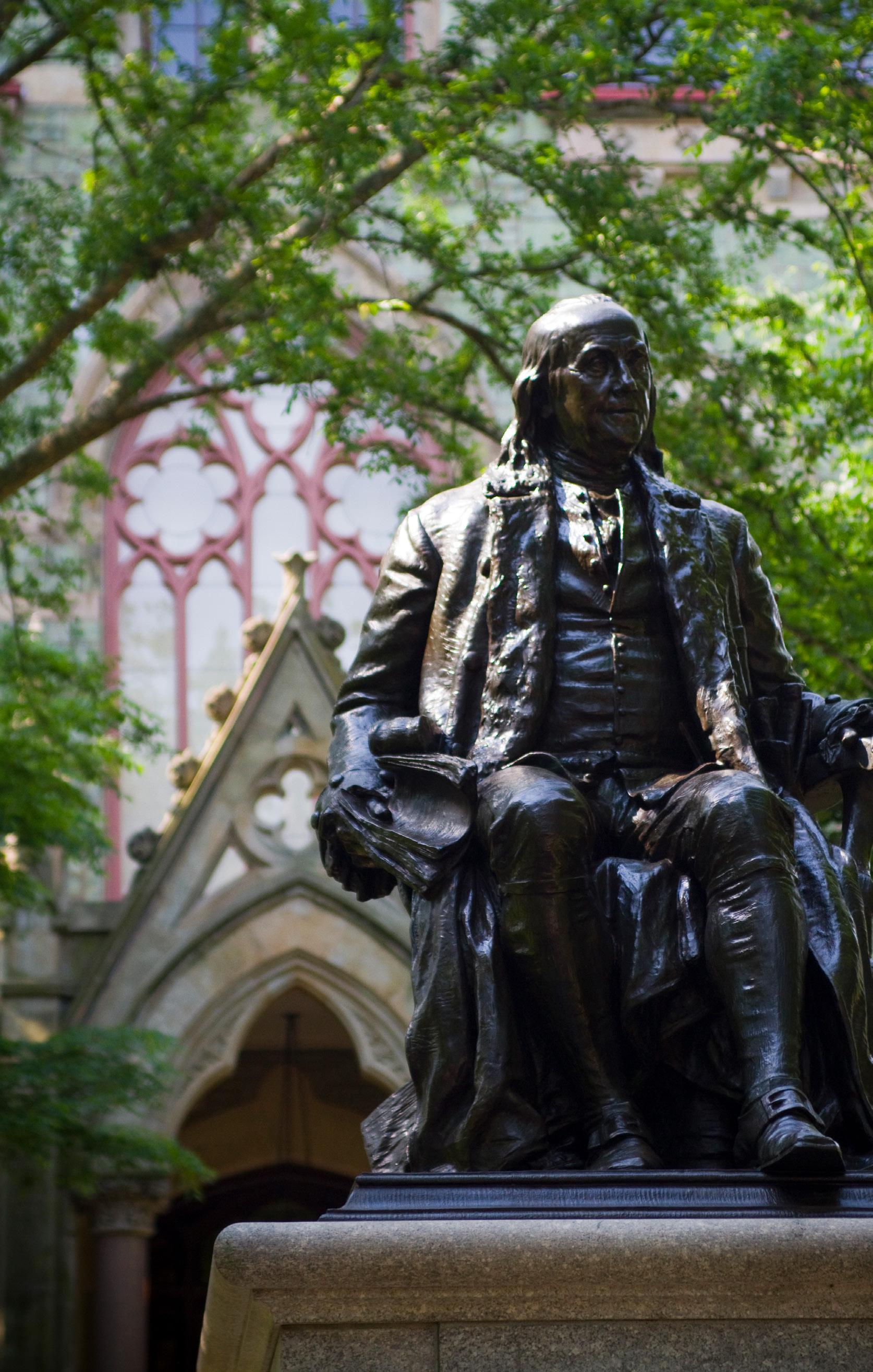
For more information, please contact: Office of Parent Outreach and Development/Penn Parents 2929 Walnut Street, Suite 300 Philadelphia, PA 19104
�� ( 215) 746-4646
Ȱ ppparent@dev.upenn.edu

3- 4 Months Before Target Start Date
Industry-Specif ic Timelines and Standards
Polished Résumé and Application Materials
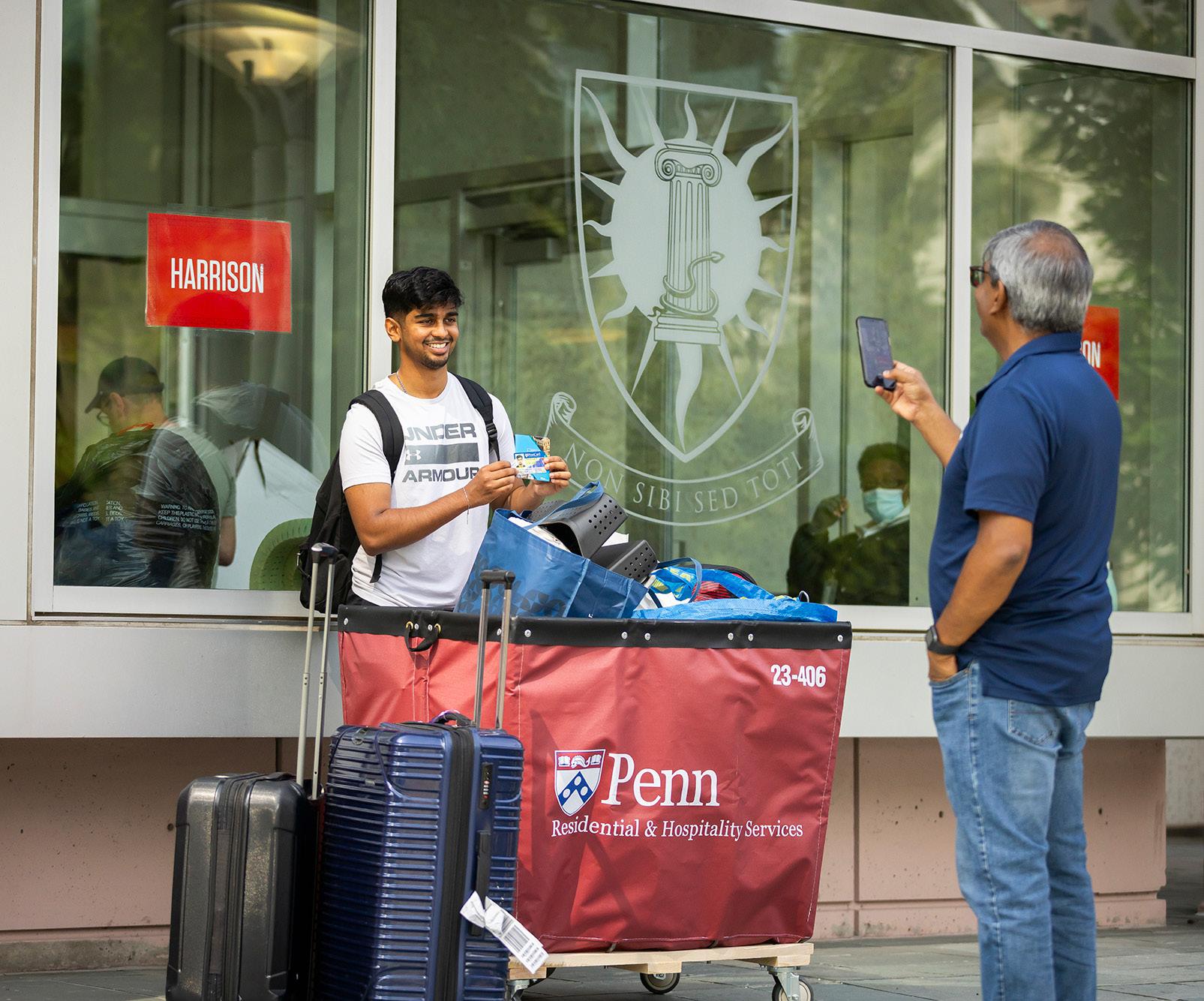
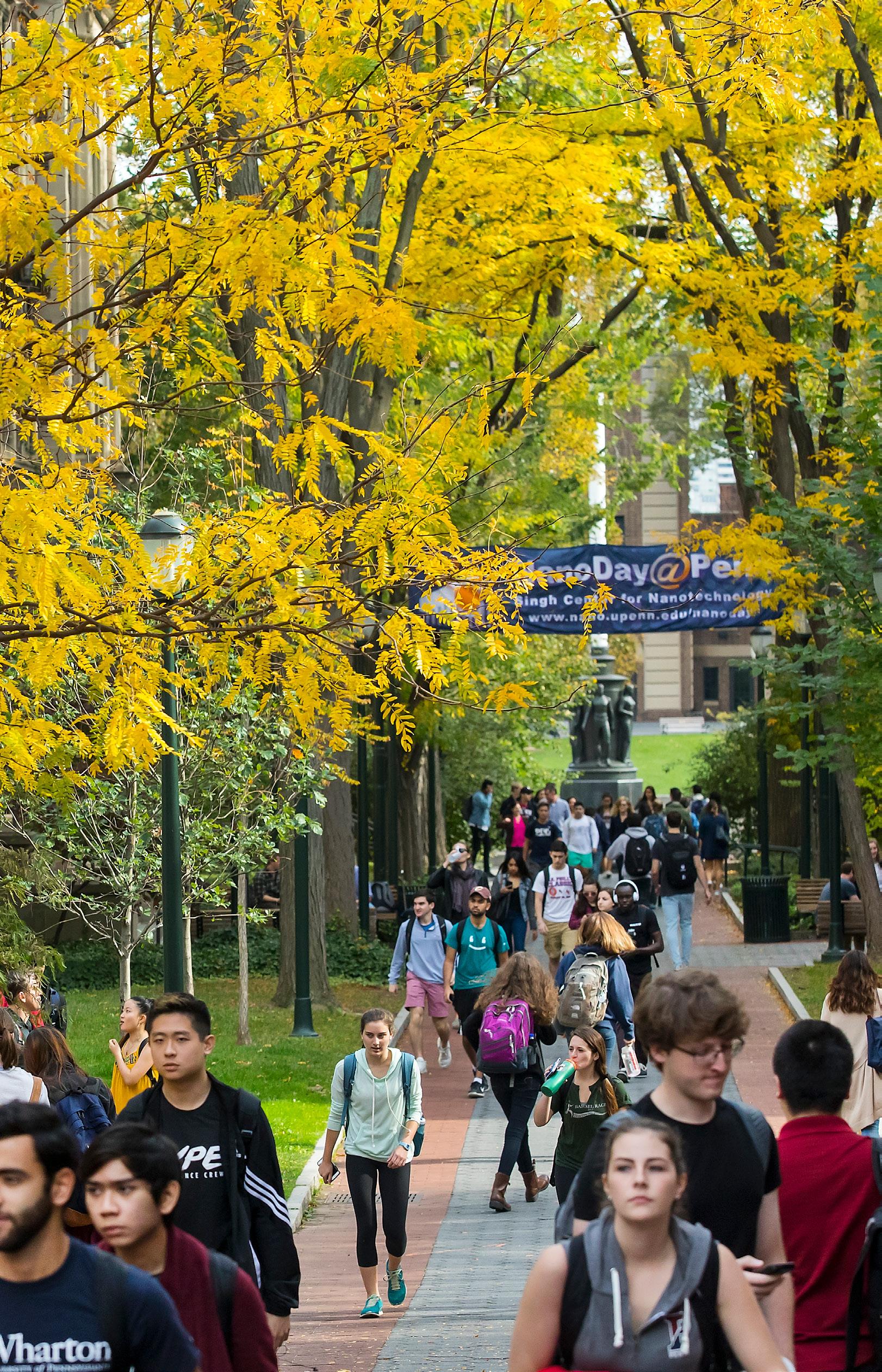
College life is quite hectic, and most students find their time packed with academic and social obligations. Take the time to remind your student to take care of themselves physically and emotionally as well as academically. A balanced life that includes work, play, and rest is essential to a healthy student.
Conflicts are a part of the parent-student relationship, particularly as your student develops more independence at school. However, you may want to prioritize what is really important to you and decide which issues you are willing to let go.
Penn offers numerous resources to enhance your student’s experience while in college. (See the Penn Resources section at the back of this guide.) Penn is a big place, but you can help your student by suggesting various resources when you think it is appropriate.
Federal law, the Family Educational Rights and Privacy Act (FERPA), protects the privacy of student educational records — which broadly includes information maintained by Penn that identifies a student. Students should be aware of their rights under FERPA, and faculty and staff should be aware of and follow their obligations under FERPA.
The University’s policy regarding disclosure of student information to parents is based both upon legal requirements and the University’s philosophy that students should be treated as adults. The University generally will not share personally identifiable information (other than directory information) from a student’s education records with third parties, including parents or guardians, without student consent, except in limited circumstances where such disclosure is
permitted under FERPA and where the University determines in its discretion that disclosure is appropriate.
Disclosure is permitted:
z In connection with an emergency if knowledge of the information is necessary to protect the health or safety of the student or other individuals.
z If a student is a dependent within the meaning of Section 152 of the Internal Revenue Code of 1954 and the parent or legal guardian has submitted a written affirmation of guardianship.
z If a student is under the age of 21, information regarding the student’s violation of any University policy governing the use or possession of alcohol or drugs when certain circumstances are present.
z In other limited circumstances, as allowed under FERPA and its implementing regulations, as they may be amended.
In cases involving a health or safety emergency or a violation of a University policy regarding the use or possession of alcohol or drugs, a decision to notify parents or guardians about information contained in an education record — and the actual communications to the parents or guardians — will be made by the Office of the Vice Provost for University Life or another senior student affairs officer, and after consultation with the student’s school office and other appropriate offices. Whenever practicable, a student whose parents or guardians are to be notified will be informed before such notification occurs and given an opportunity to initiate contact with his or her parents or guardians.
In today’s world, it is important for students and families to understand and discuss risks to personal privacy, and ways to minimize those risks. Penn offers programs that give students choices regarding when and with whom their personal information is shared. See the Student Registration and Financial Services website for more information: srfs.upenn.ed u/parents.
The University of Pennsylvania is a historic Ivy League school with highly selective admissions and a history of innovation in interdisciplinary education and scholarship.
With its green lawns and landmark architecture, Penn’s beautiful West Philadelphia campus houses all of Penn’s activities, from student life, athletics, and academics to research, scholarship, and cultural life. All of Penn’s 12 schools and six centers are located within walking distance of one another. This geographical unity, unique among Ivy League schools, supports and fosters Penn’s interdisciplinary approach to education, scholarship, and research.
Fast Facts

The University of Pennsylvania has the distinction of being the first university in the United States, created by Founding Father Benjamin Franklin. J. Larry Jameson was inaugurated as Penn's 10th president this past spring.
Penn’s sports teams are nicknamed the Quakers after the religion adopted by William Penn, who established Pennsylvania as a Quaker province. Today, we see the Quaker at Penn football and basketball games.
First held in 2019, U-Night celebrates the change in status as Penn Second-Years become rising Juniors. Just as first-years celebrate Convocation, Juniors celebrate Hey Day, and Seniors celebrate Final Toast— our Second-Years have U-Night. The event features a lantern-lighting ceremony, as well as free food, music, raffles, merch, and speeches from Class Board and special guests such as the Penn President and Provost.
In 1916, Hey Day was established as a “Moving-Up” celebration to mark the advancement of each class. Hey Day has represented the official passage of the junior class to senior status and is characterized by marching students parading around campus wearing red t-shirts, carrying canes, and biting into fake straw hats.
In 1873, the first graduating class on Penn’s West Philadelphia campus established Ivy Day as a new tradition set aside for the senior class. As a vine was planted and an invocation pronounced, ivy became a lasting symbol for each year’s graduating class.
Of those accepted for admission to the Class of 2028, 59 percent are black, Hispanic, Asian or Native American. Women comprise 56 percent of all students currently enrolled.
Of the international students enrolled in the Class of 2028, 15% are from Africa and the Middle East, 37% from Asia, 3% from Australia and the Pacific, 17% from Canada and Mexico, 5% from Central and South America and the Caribbean, and 23% from Europe.
The University of Pennsylvania has more than 70 academically based community service courses that are taught each year. The courses enroll approximately 1,800 undergraduate and graduate Penn students each year.
A charter member of the Ivy League, Penn offers varsity intercollegiate competition for men in 17 sports and for women in 16 sports.
With 214 research centers and institutes, research is a substantial and esteemed enterprise at Penn. The scale and interdisciplinary character of our research activities make Penn a nationally ranked research university.
Penn is home to over 5,800 professors. Over the past two decades the faculty have been home to nine MacArthur Award recipients, one National Medal of Science recipient, two Nobel Prize recipients, and three Pulitzer Prize recipients.

Penn Arts and Sciences, the University’s intellectual core, houses nearly 500 faculty in 27 departments in the humanities, social sciences, and natural sciences, covering diverse disciplines ranging from music to criminology, to chemistry and anthropology. The College of Arts and Sciences is the academic home of the majority of Penn undergraduates and provides 60% of the courses taken by students in Penn’s undergraduate professional schools. The College curriculum teaches students to analyze, communicate, and transform facts into knowledge that can be applied to any number of professions. Undergraduate offerings include 55 majors, signature interdisciplinary programs, and other academic opportunities.
Founded in 1852 as the School of Mines, Arts and Manufactures, today’s School of Engineering and Applied Science is a vibrant part of the University. At Penn Engineering, world-acclaimed faculty, stateof-the-art research laboratories, and highly interdisciplinary curricula offer students an unparalleled experience. Undergraduate offerings include 12 majors and 55 areas of study. Innovation and technology drive the program and transform the fundamentals of what future engineers are learning. Penn Engineering students play a critical role in posing and tackling some of the most pressing problems that face our world today.

MATCH on textbooks from Amazon.com or with BN.com (Marketplace and 3rd party sellers excluded)

Penn Nursing is a premier academic and research institution renowned for advancing the frontiers of nursing science and patient care. Within their two undergraduate majors, Penn Nursing offers a number of unique and exciting resources, including a stateof-the-art simulation lab, classrooms with the latest hospital-based electronic health records (EHR) technology, and clinical experiences in the top-ranked Children’s Hospital of Philadelphia (CHOP) and Hospital of the University of Pennsylvania (HUP). Our students learn from leaders in nursing research, education, and practice who ensure Penn Nursing remains one of the top nursing schools in the world. At Penn Nursing, students become part of the next generation of healthcare leaders, prepared to care for patients, conduct landmark research, and make new strides in healthcare management and health policy.
Founded in 1881 as the world’s first collegiate business school, the Wharton School of the University of Pennsylvania is shaping the future of business by incubating ideas, driving insights, and creating leaders who change the world. With a faculty of more than 235 renowned professors, Wharton has 5,000 undergraduate, MBA, Executive MBA, and doctoral students. Undergraduate offerings alone include 19 majors. Each year 13,000 professionals from around the world advance their careers through Wharton Executive Education’s individual, company-customized, and online programs. More than 104,000 Wharton alumni form a powerful global network of leaders who transform business every day.


Students in the College have a strong network of academic advisors available to assist them throughout their undergraduate careers. Pre-major advisors help firstand second-year students navigate their entrance into academic and intellectual life in the College beginning with the issues of incoming first-years and continuing through the student’s exploration of a potential major. After declaring a major, students are assigned a major advisor affiliated with the program. All students are welcome and encouraged to speak with assistant deans for advising in the College Office. These advisors can help students explore the many options and opportunities available to College students, and they are available by appointment or on a drop-in basis throughout the year.
�� (215) 898-6341
Ȱ college@sas.upenn.edu
�� college.upenn.edu/advising-resources
All students in Penn Engineering are assigned to a faculty advisor and a peer advisor in their major. Students who are curriculum deferred are assigned professional advisors experienced in working with students who may still be deciding. Each undergraduate major or program has an assigned coordinator who can help students with most issues pertaining to their major. In addition, students can meet with professional advisors to discuss non-major related academic issues such as dual degrees, minors, study abroad, and accelerated master’s degrees, as well as to ask for help accessing academic and student support resources.
�� (215) 898-7246
Ȱ academic-services@seas.upenn.edu
�� ugrad.seas.upenn.edu
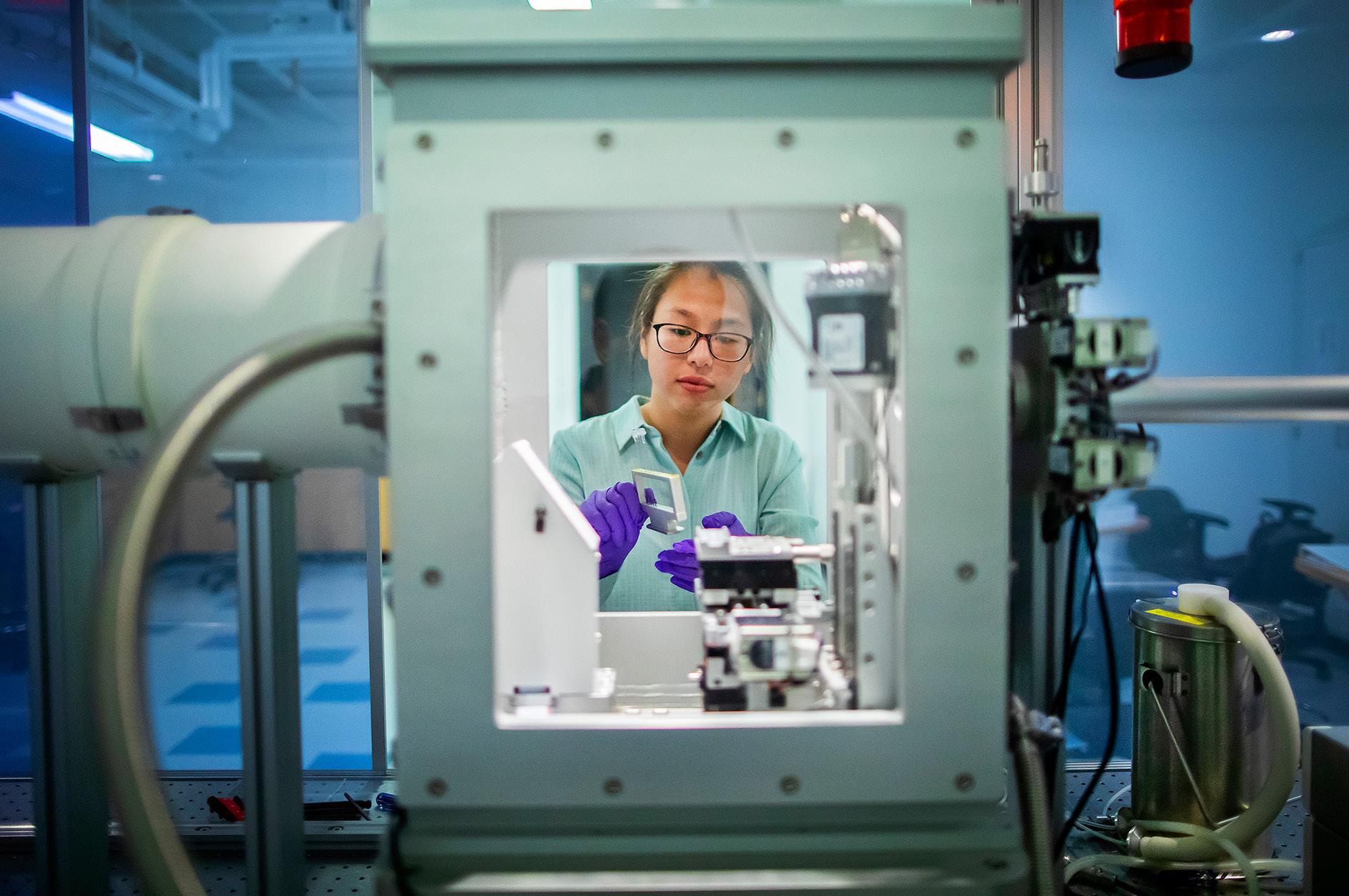
All students in the School of Nursing are assigned a faculty advisor and a peer advisor. Students also have access to professional staff advisors in the Office of Academic Affairs. Faculty advisors provide students with mentoring related to their career goals and serve as a resource for students to discuss the current issues, science, and practices of the nursing profession. The Office of Academic Affairs partners with the faculty advisors to provide information on registration, degree requirements, dual degrees, minors, study abroad, sub-matriculation, and University resources. Peer advisors help ease the firstyear transition into college and are available to answer their advisees’ questions about student life at Penn. Students remain in touch with their advisors throughout their undergraduate career.
�� (215) 898-6687
Ȱ advisor@nursing.upenn.edu
�� nursing.upenn.edu/students
All Wharton students are assigned to a professional academic advisor in the Undergraduate Division who can help them:
z Explore intellectual interests
z Develop suitable educational plans and goals
z Select appropriate courses and other educational experiences
z Understand institutional and degree requirements
z Connect with resources
z Work through any academic challenges
Advisors are available Monday through Friday by appointment and for drop-in advising during Advance Registration and other peak advising times. Peer advisors are also available for drop-in advising weekdays during the fall and spring semesters.
�� (215) 898-7608
Ȱ undergradinfo@wharton.upenn.edu
�� undergrad-inside.wharton.upenn.edu
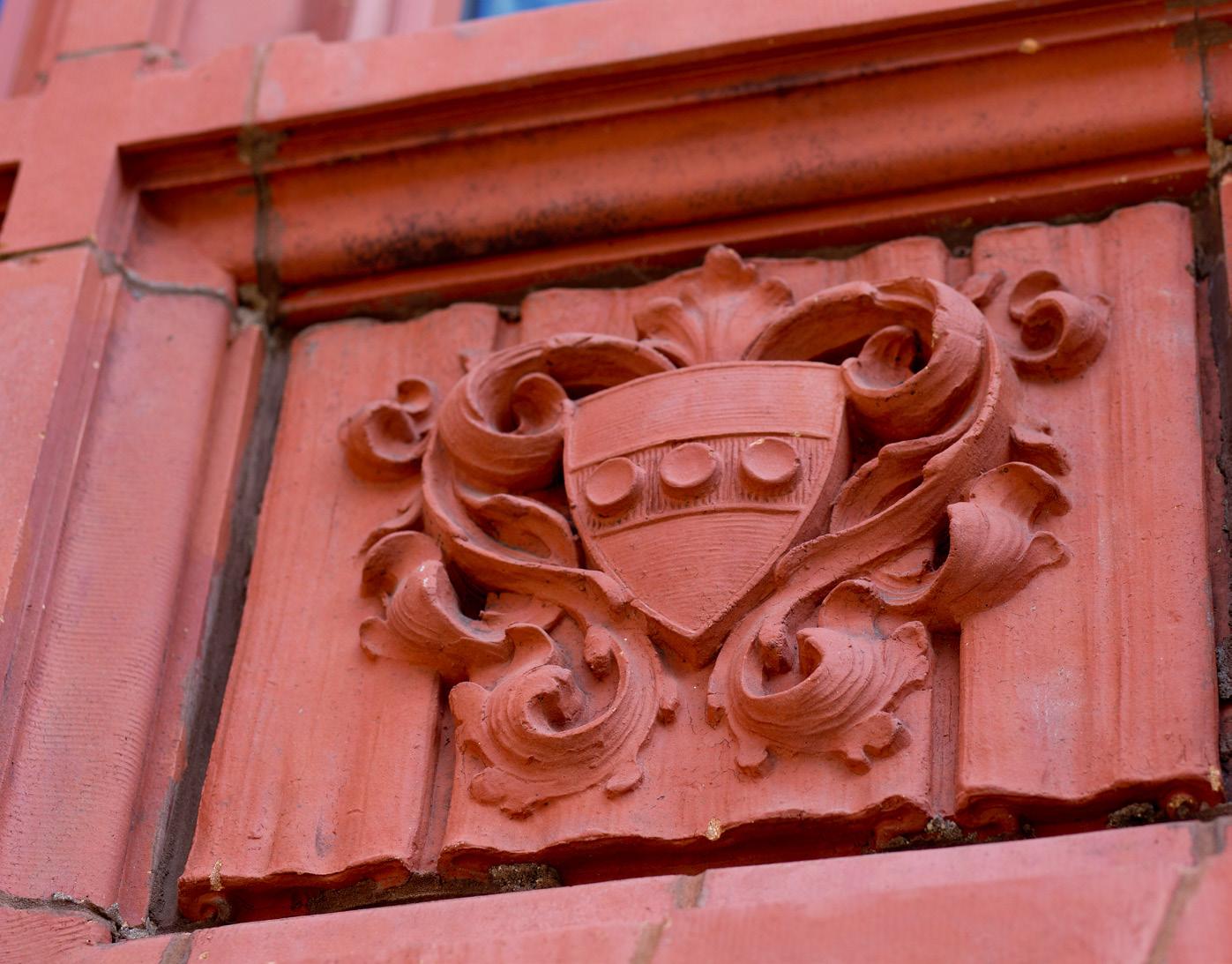
Career Services helps Penn students define their career goals and take the steps necessary to achieve them.
Penn Career Services helps students with all aspects of their career journey, from the exploration phase (exploring career interests and learning about industries and job functions) to creating strong resumes and cover letters, refining interviewing skills, and negotiating offers. Professional advisors are also available to assist students in applying to graduate and professional school programs. Career Services offers a wide array of skill-building workshops, a large number of online resources and a variety of ways for students to connect with employers including interview schedules,
career fairs, employer information sessions, and a robust job and internship board. New Penn students will gain access to Career Services, including the ability to access the main Career Services platform, Handshake, and schedule appointments with career and pre-graduate school advisors once their first semester has officially started.
Parents can visit the Career Services “Parents” webpage careerservices.upenn.edu/channels/parents for general information and year-by-year advice.

It’s the start of your Penn journey, and no matter what your academic path, the Penn Libraries is here to support you every step of the way.
Our friendly, knowledgeable staff provide guidance and support for Penn students year-round. Librarians can help you develop your research skills, find the perfect resources for your project or paper, and get specific support in every academic discipline, from dentistry to design.
Our 19 library locations offer large tables in quiet study areas, lounges with soft furniture, reservable rooms and booths for groups, and more.
The Penn Libraries offers print and electronic books, journal and newspaper articles, videos, sound recordings, manuscripts, and even some textbooks. And that's not all: you can also sign up for news subscriptions, try letterpress or 3D
printing, and borrow equipment ranging from binoculars to musical instruments, all available to you at no extra cost as a Penn student.
Learn new skills to support your academic experience, explore unique items from our archives, or take a study break while connecting with your classmates.
Penn Libraries
ͤ 3420 Walnut St Philadelphia, PA 19104
Ȱ librarynews@upenn.edu
�� library.upenn.edu
Connect with us
@upennlib on Instagram
Ń facebook.com/PennLibraries
�� Newsletter: alumni.upenn.edu/libsignup

Whether Penn students study abroad for a week or an academic year, they’ll come away with an entirely new frame of reference for understanding the world and their role in it.
Penn offers a wide range of programs to meet students’ personal and academic goals. Among the many offerings from across Penn, highlights include:
z Study Abroad (SA) program provides students the opportunity to establish themselves in a new global community through extended study for a semester, year, or summer. Penn partners with top universities worldwide in one of the most extensive undergraduate student exchange networks of any Ivy League university.
z Penn Global Seminars (PGS) combine an intensive semester-long campus seminar with a short-term international travel component led by the course’s instructor. These innovative and affordable programs offer all undergraduate students the opportunity to integrate immersive global travel into their Penn experience.
z The Global Research and Internship Program (GRIP) provides students the opportunity to intern or conduct research abroad for eight to 12 weeks during the summer. These experiential opportunities are available in a diverse range of industries and allow students to apply their academic knowledge to a global workplace.
z Penn Global Research Institutes (PGRI) provide outstanding undergraduate and graduate students the opportunity to conduct research abroad alongside Penn faculty during. Participants work as part of a small research team, gain hands-on fieldwork experience, and receive funding to offset project and travel expenses.
Penn Abroad ͤ 5th and 6th Floors 3935 Walnut St. Philadelphia, PA. 19104 �� global.upenn.edu/pennabroad
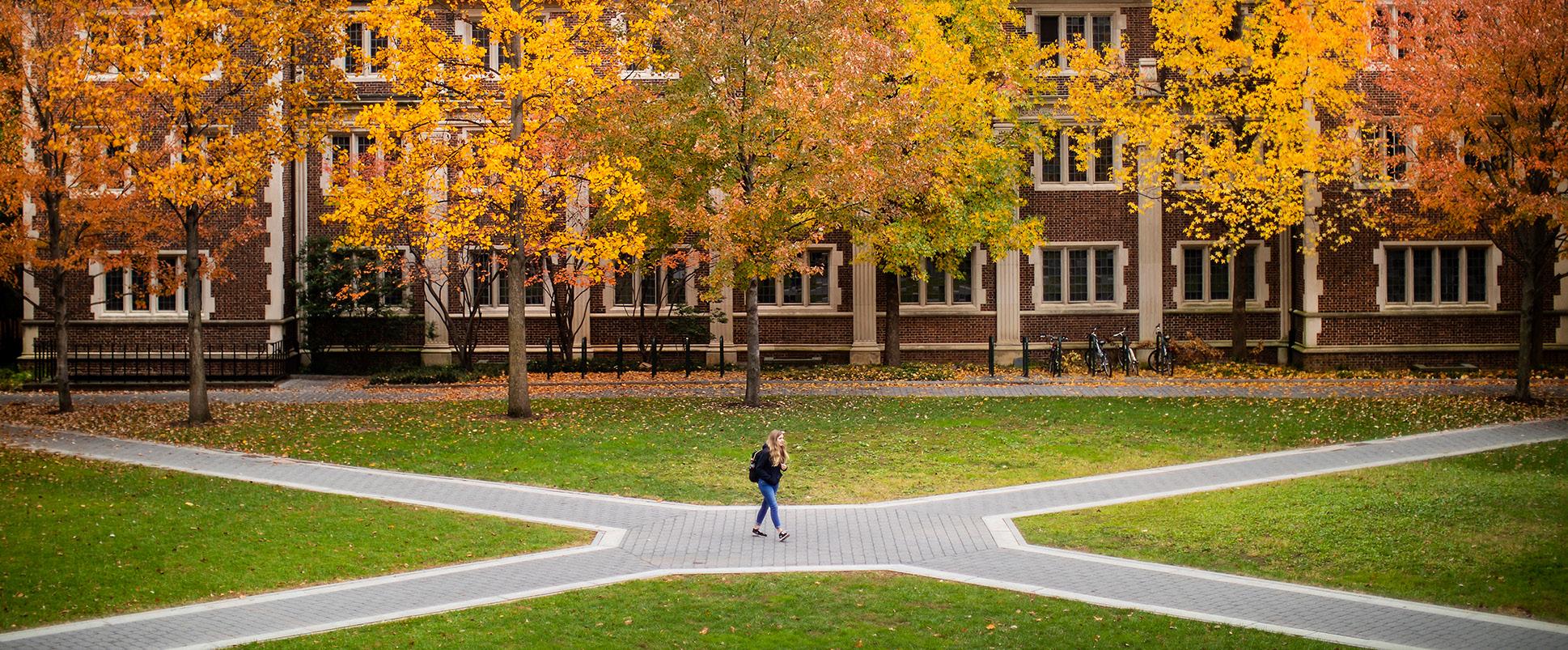
International students play an important role at Penn as their presence enriches the academic and cultural experience inside and outside the classroom. Penn prides itself on having one of the largest populations of international students in the U.S., and the campus boasts a vibrant and welcoming home for our global community. ISSS is there every step of the way.
Soon your student will embark on a lifechanging journey. ISSS of Penn Global is one of the first and last offices that an international student will engage with at Penn. ISSS supports all international students from the time they request immigration documents, throughout their Penn journey, and in their professional lives beyond graduation.
The two core responsibilities of ISSS include immigration service and integration support. ISSS staff provides expert advice on anything related to immigration, including documents, travel concerns, and U.S. employment authorization. ISSS at Penn is unique compared to other universities, offering a range of integration initiatives and opportunities to connect with other students and campus resources to enhance the Penn experience.
Highlighted integration programs include: Forerunner, International Student Orientation, Welcome Picnic for New International Students, Intercultural Leadership Program, International Student Advisory Board, Your World@Penn Social Media Platform, and the Graduation Reception for International Students.
International Student and Scholar Services, Penn Global
3819 Chestnut Street, Suite 305 Philadelphia, PA 19104
(215) 898-4661
global.upenn.edu/isss
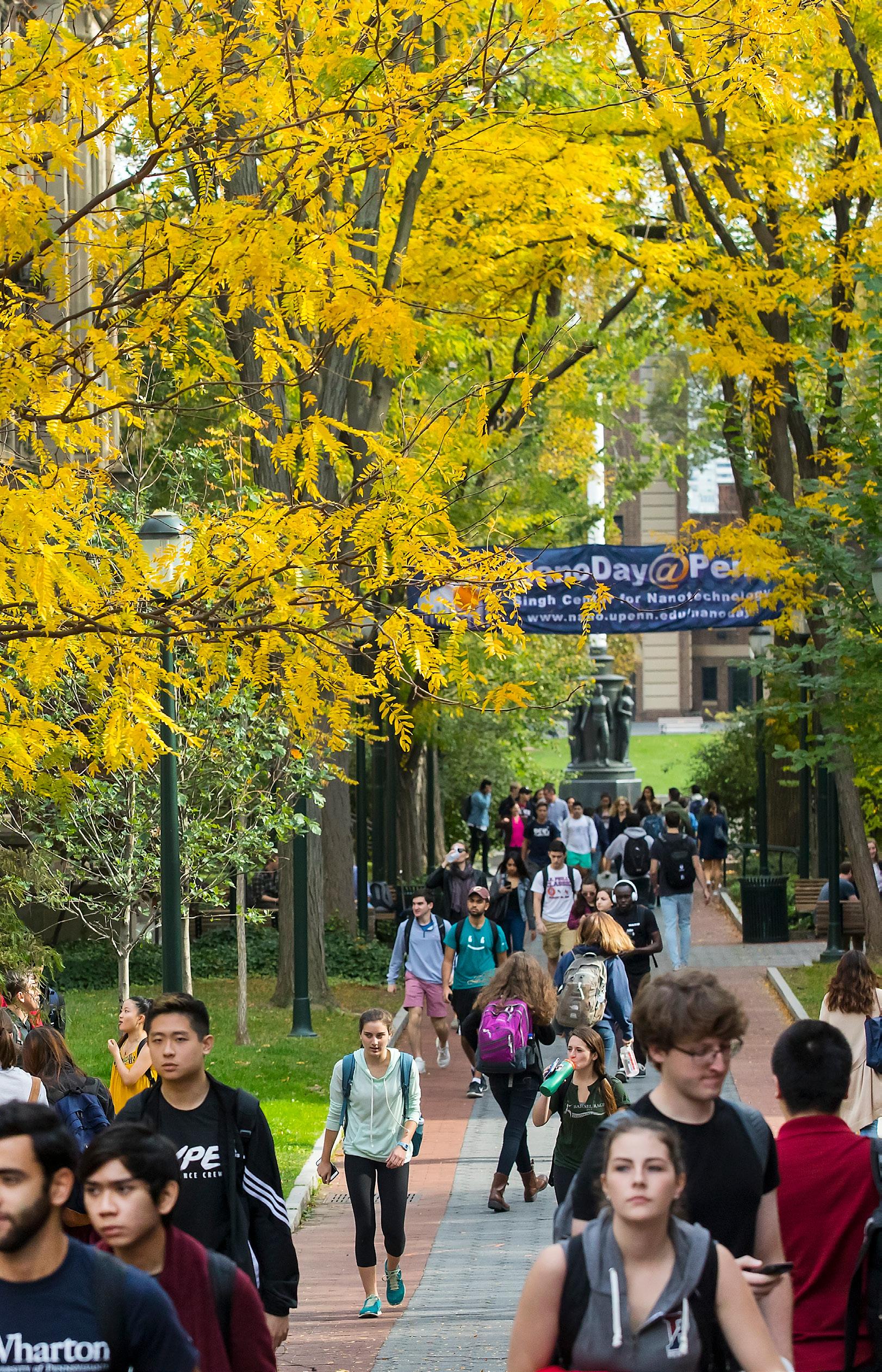
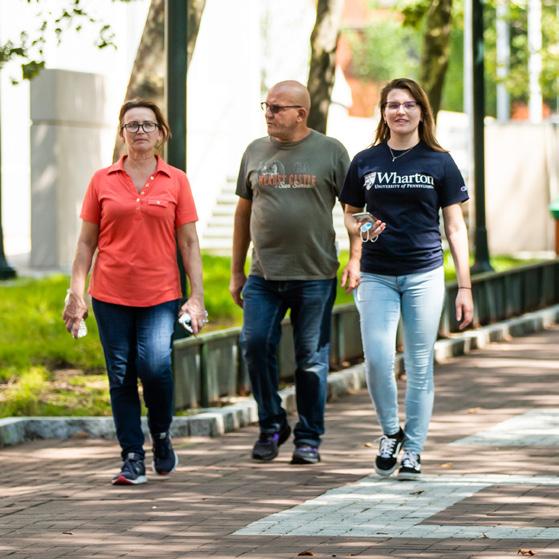
Parents and family members are often the first to hear about students’ academic challenges and stress surrounding assignments and exams. The Weingarten Center is Penn’s home for Academic Support and Disability Services. Accompanying students along their academic journey underscores the Weingarten Center's unified mission.
Learning specialists work with undergraduate, graduate, and professional students in individual learning consultations to build and strengthen study strategies as they engage with their Penn coursework. Areas of focused support include time and project management, organization, academic reading, research, and writing, problem-solving, and exam preparation. Students can meet with learning specialists for in-person or virtual 50-minute appointments or 25-minute inperson drop-in sessions. Group workshops that address the needs and interests of specific groups of students are also available throughout the year.
Tutoring Services offers Penn undergraduate students free, accessible, and convenient options to supplement their academic experience in a wide variety of courses. Qualified peer tutors will work with the student to better understand and engage with specific course content. Tutoring can be accessed through various formats, including individual or small group appointments and drop-in sessions depending on the course.
Disability Services supports students who self-identify with a disability in order to ensure equal access to all University programs, activities, and services. The process begins when a student requests an accommodation, provides documentation of their condition, and meets with a Disability Specialist. Students who receive accommodations work with the Disability Services staff to coordinate their academic accommodations as well as accessible housing, dining, communication, and technology. Through ongoing collaboration with the Weingarten Center, students learn to identify and utilize individualized accommodations and strategies that support their full participation in university life.
Weingarten Center
ͤ Stouffer Commons 3702 Spruce St, Suite 300 Philadelphia, PA 19104
�� (215) 573-9235
ˇ (215) 746-6320 for TDD
�� weingartencenter.universitylife. upenn.edu
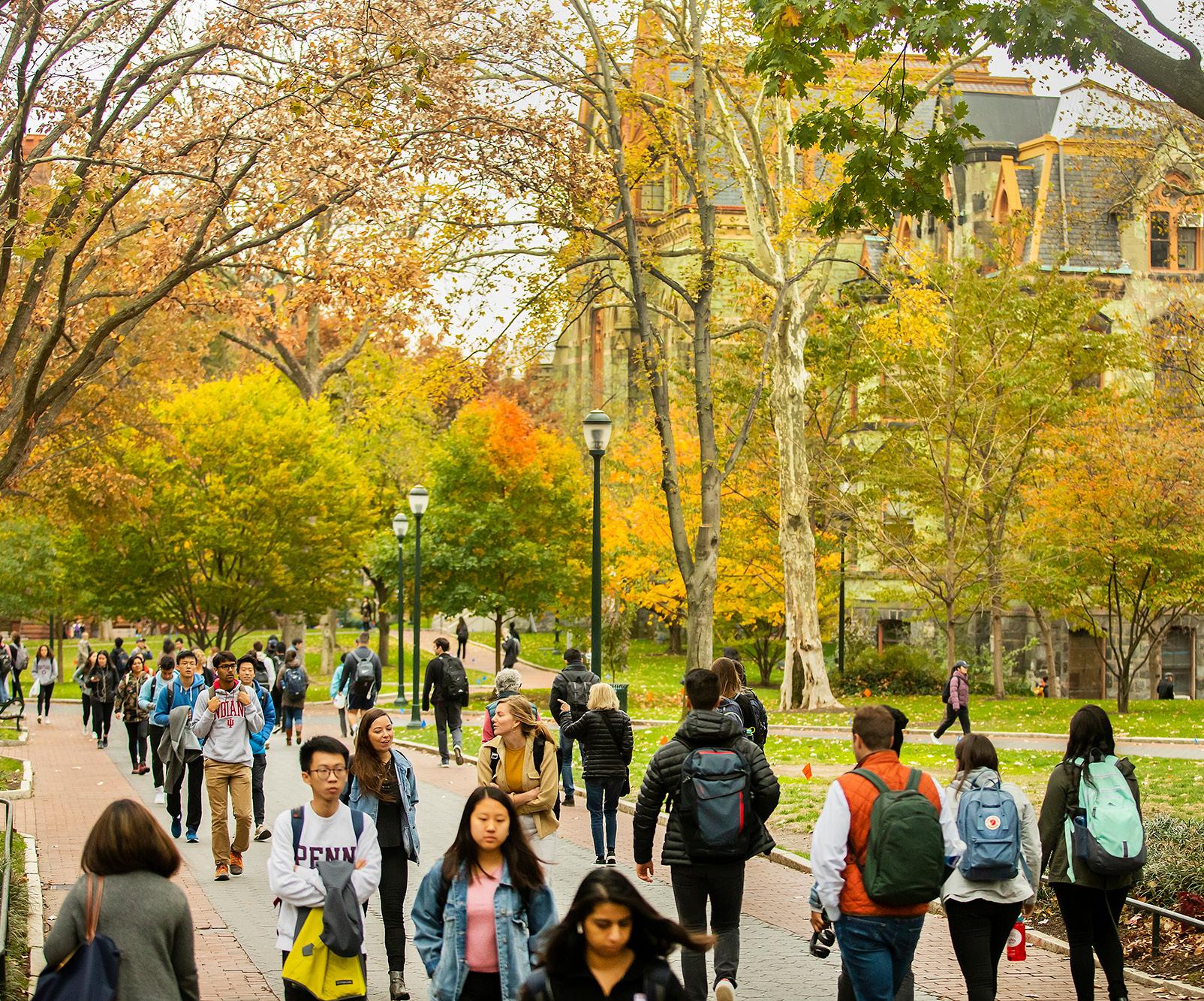
Student Employment, part of Student Financial Aid, provides academic year job listings, including both work-study jobs and jobs for students who do not receive a work-study award. International students will need to comply with certain immigration rules even for on-campus jobs. The Student Employment website includes more information on these guidelines.
Ȱ seomail@pobox.upenn.edu
�� srfs.upenn.edu/student-employment
Penn offers several payment plans and financing opportunities to assist with your student’s educational expenses. Families can select one plan, or combine several, to meet their needs. If you decide to borrow, we recommend federal loan programs (Federal Direct Loan for students and Direct PLUS Loan for parents), as repayment is more flexible. You can also enroll in a Penn Payment Plan and spread your expenses across four or five payments each semester.
�� srfs.upenn.edu/billing-payment/ financing-and-payment-plans
Outside scholarships (i.e., scholarships awarded from sources outside the University) can be an important resource. Penn students may pursue outside scholarships to avail themselves of additional financial flexibility. More information on outside scholarships, including their impact on a student’s needbased financial aid package, can be found on the SRFS website.
�� srfs.upenn.edu/financial-aid/outsidescholarships
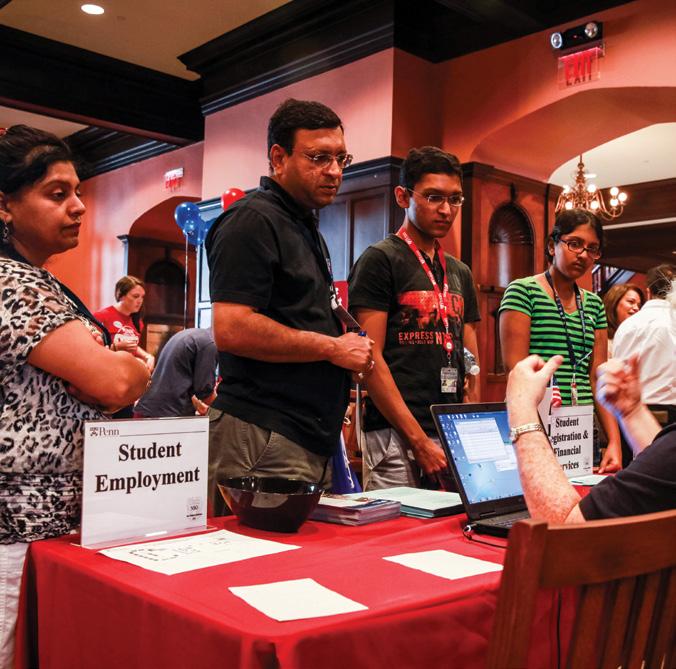
Penn.Pay is Penn’s online billing system through which your student receives their student account bill. Your student can review new daily activity and opt to pay their bill online, securely and efficiently. To comply with federal regulations (FERPA), your student must invite you to be an Authorized User in order for you to access Penn.Pay.
Your student’s first bill is sent at the beginning of July, with a due date near the end of July (check the billing schedule on the SRFS website for exact dates). When the bill is ready, SRFS will send an email notification to your student’s University email address and to any authorized users associated with the account. Your student’s first bill will include all of their semester charges, including tuition, fees, housing, and dining. SRFS sends a new bill each month reflecting any additional charges.
Full payment of the student account bill is due by the date indicated on the statement. Students are responsible for paying any amounts not covered by financial aid, loans, outside scholarships, or payment plans. A late payment penalty of 1.5% of any past due balance will be assessed each month and may result in the account being placed on financial hold, which restricts future registration, diplomas, and transcripts.
Payments can be made with a U.S. checking or savings account or your credit card. Note that credit card payments are assessed a convenience fee. Penn does not receive any compensation or portion of the convenience fee. Personal checks are also accepted through mail or in person, or funds can be sent via a wire transfer.
Penn does not accept cash payments for student accounts.
�� srfs.upenn.edu/billing-payment
We strongly encourage you to review the SRFS Must-Do List with your student and have them complete it as soon as possible. The Must-Do List addresses your student’s safety on campus, privacy rights, signing up for Penn.Pay, and enrolling in direct deposit for easy payment of work-study funds and student account refunds.
�� srfs.upenn.edu/must-do
This SRFS initiative aims to enhance students’ financial well-being by providing personal finance education, tools, and resources. Our goal is to help students feel empowered to set financial goals, make informed financial decisions, and improve their financial behaviors. We believe every student should leave Penn with a plan for their financial future. Look for opportunities to engage with Financial Wellness during NSO, throughout the academic year, and online.
�� srfs.upenn.edu/financial-wellness
Campus Express at Penn® allows allows your student to sign up for many essential student services at Penn. Your student should first go to Campus Express Online, which opens June 1, 2025.
With Campus Express Online, students have direct access to many of the services they’ll need to make their life at Penn safe, convenient, and comfortable. They can apply for a University identification card, see their room layouts, confirm housing, download their free copy of Office 365 ProPlus, take advantage of educational discounts on computers, buy textbooks, register property, review resources related to banking and financial wellness, sign up for a dining plan, and learn about transportation options. To access Campus Express, students will need a PennKey. A postcard explaining all the online services is sent to the homes of all new students in May. Campus Express opens for newly admitted undergraduate students on June 1, 2025. Upperclass students can access the online services at any time.
Go to campusexpress.upenn.edu to learn more.
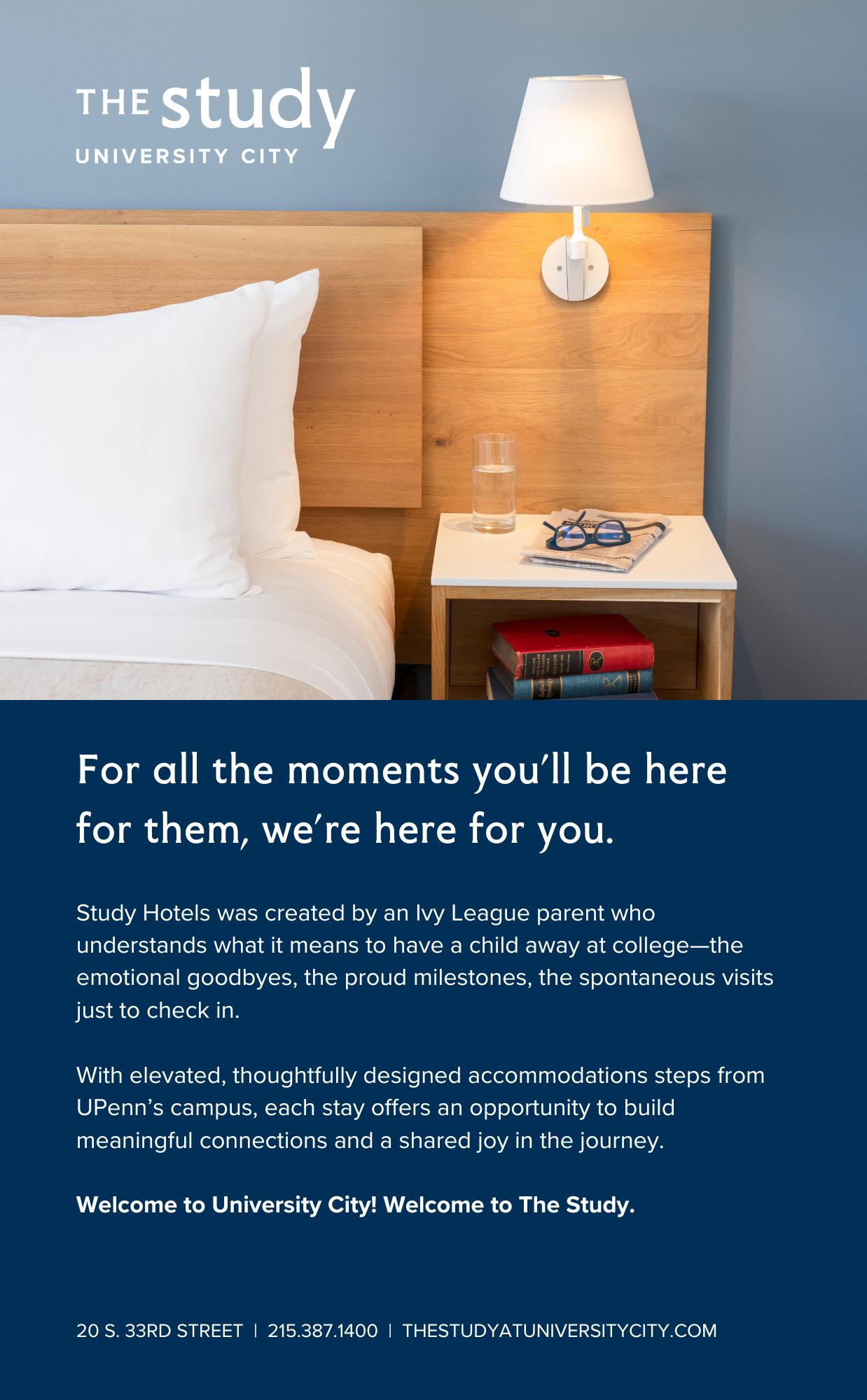






The PennCard is the official University of Pennsylvania identification card required for all students, faculty, and staff. The PennCard is used for many services, including building access, library services, campus transit, dining plans and Dining Dollars, recreational facility access, Student Financial Services (SFS) line of credit, and PennCash purchases.
Your student should apply for their PennCard as soon as Campus Express
Online opens, beginning June 1 but no later than June 30, 2025.
As a convenience, notary services, passport photos, lanyards and card cases, and postage stamps are available throughout the year at the PennCard Center, located on the second floor of the Penn Bookstore (3601 Walnut St).
PennCash—an optional prepaid debit feature available on the PennCard—allows students to make cash-free purchases around campus quickly and conveniently. Easy to replenish and immediately available for use, students can use it to make purchases on campus at the Penn Bookstore and Penn Dining retail cafés, as well as to access printers and copiers at Penn libraries and academic buildings. To load PennCash, go to upenn.edu/penncash and use a Visa or MasterCard, or transfer from the Student Financial Services line of credit. Students can also grant access to family members for the online PennCash account so that they may add value and view the account activity.
Q When does a new student need to apply for a PennCard?
AAs soon as CampusExpress Online opens on June 1, students should log in at campusexpress.upenn.edu and click “Your PennCard.” To ensure their PennCards will be ready for pickup during Move-In, students should finalize and submit their PennCard applications as quickly as possible. After June 30, 2025, students will not be able to apply for their PennCards online.
AQWhere does a new student pick up their PennCard?
Students will be given their PennCards when they move into their College House. Students who arrive on campus after New Student Orientation should stop by the PennCard Center, located on the second floor of the Penn Bookstore.
Important: Students must pick up their own PennCards in person. To receive a PennCard, they are required to present one of the following forms of original photo ID:
z Domestic students: Photo identification such as a driver’s license or non-driving photo ID card, issued by a U.S. state or territory; passport issued by the United States government; any other passport the student is entitled to hold.
z International students: Passport of the country of which they are a citizen or subject. Other forms of ID are not valid for PennCard pickup.
AQWhat can students do with their PennCards?
With a PennCard, students may:
z Enter campus academic and residential buildings
z Enter dining cafés, access dining plans, and preorder and pay through the Penn Eats dining app
z Make purchases using PennCash
z Link to a PNC Bank account, enabling PennCard to act as an ATM or bank-debit card
z Charge purchases to a Student Financial Services line of credit
Q How safe is PennCash?
AThe value in a PennCash account is not stored on the card. If a PennCard is lost, the PennCash account is frozen as soon as the student notifies the PennCard Center (215-417-CARD) or the Division of Public Safety (215- 573-3333).

Penn was the first university to establish what many institutions still recognize as the model for today’s premier collegiate retail shopping experience.
The Penn Bookstore offers a unique assortment of products and services to specifically meet the needs of Penn students and parents. In addition to textbooks and course materials, the Penn Bookstore is a go-to resource for technology products, school supplies, and a unique assortment of Penn-branded apparel and merchandise for the entire family.
With the Bookstore’s convenient online textbook purchasing system, students have the option of having their textbooks shipped directly to their home or picking them up at the Penn Bookstore when they arrive on campus. Pick-up orders will be available in the textbook department, packed, and with a register receipt. Keep the receipt and textbooks can be returned for a full refund until the second week of classes.
There are numerous benefits to purchasing textbooks through the Penn Bookstore, which offers flexible formats including new, used, rental, and digital. The Penn Bookstore makes student savings a priority through a number of affordability initiatives. The textbook rental program allows students
to use the book in the same way as if they purchased it outright (e.g. ability to highlight and write in the margins). Renting a textbook may save up to 50% over the cost of purchasing a new book and, at the end of the semester, students can choose whether they wish to return the book or purchase it.
Used textbooks are another popular option. The difference between a new textbook price and a used textbook price is approximately 25%. Because used textbooks are in high demand, students are encouraged to make their purchases early to increase their chances of obtaining a used book.
The Bookstore’s online Course Material Concierge lets students know if new, used, rental, or digital versions of a text are an available option.

The Bookstore will match the price of any new, used, or used rental textbooks sold directly from Amazon.com , BN.com , or local providers (this offer does not include 3rd party sellers or marketplaces). More information on the program is available at upenn.bncollege.com/we-price-match .
The Bookstore also offers many ways to pay. In addition to accepting all major credit cards including Visa, MasterCard, American Express, and Discover, students have the option to charge their textbooks directly to their Student Financial Services or PennCash account by providing their PennCard number. Students can also use a Barnes & Noble Gift card toward textbook purchases!
With a generous return policy, your student never has to worry about a schedule change. Textbooks can be returned for a full refund until the second week of classes with the receipt. After two weeks and up to the first 30 days of the semester, textbooks can be returned with original receipt and proof of schedule change.
Located on campus, the Penn Bookstore offers a range of products that can help your student start life at Penn. In addition to essential course materials and school supplies, the Bookstore has all the basic necessities for any room or apartment including lamps, desk and shelf units, electronics, and bed and bath accessories. Gift items are available, and of course, books! The Penn Bookstore carries thousands of fiction and non-fiction titles as well as a variety of periodicals and journals.
In addition, the Bookstore offers students and their families a way to show their Penn Pride! A wide selection of Penn apparel including sweatshirts, t-shirts, jackets, hats, and other insignia merchandise is available as well as an array of Penn jewelry and other gift items.
The Bookstore is also home to a Starbucks café offering the complete range of coffees, to-go meal options, and the ability to use the Starbucks app.
Penn Bookstore
3601 Walnut St Philadelphia, PA 19104
(215) 898-7595
upenn.edu/bookstore

The University of Pennsylvania is serviced by an integrated system of transportation options.
Transit services are typically no more than a five-minute walk from any part of campus, as University students have access to a wide variety of buses, shuttles, trolleys, and trains.
In addition to Penn Transit services, highlighted on these pages, students can also navigate campus on Loop Through University City (LUCY) buses and the Drexel University bus system, both free with a valid PennCard. Southeastern Pennsylvania Transportation Authority (SEPTA) services are close at hand to take students to Philadelphia’s many cultural, shopping, and recreational venues. And SEPTA’s dedicated Airport line, which runs to and from Philadelphia Airport every 30 minutes, stops at the Penn Medicine Station on campus as well as at nearby 30th Street Station.
Penn Transit’s buses and shuttles help students travel between campus and the neighboring communities safely and efficiently. Penn Transit Services are free of charge to all Penn community members holding a valid PennCard.
Penn Bus runs four campus-based, fixedroute services Monday through Friday: The Pennovation Works loop runs from 8 a.m. to 6 p.m.; East, West,and North routes operate from 4 p.m. to midnight (with the last bus starting at 11 p.m.). Buses run year-round, except for holidays observed by the University.
Penn’s Evening Safety Shuttles provide transportation between a Penn Transit stop and off-campus locations in West Philadelphia, Center City, and Powelton Village (within defined boundaries).
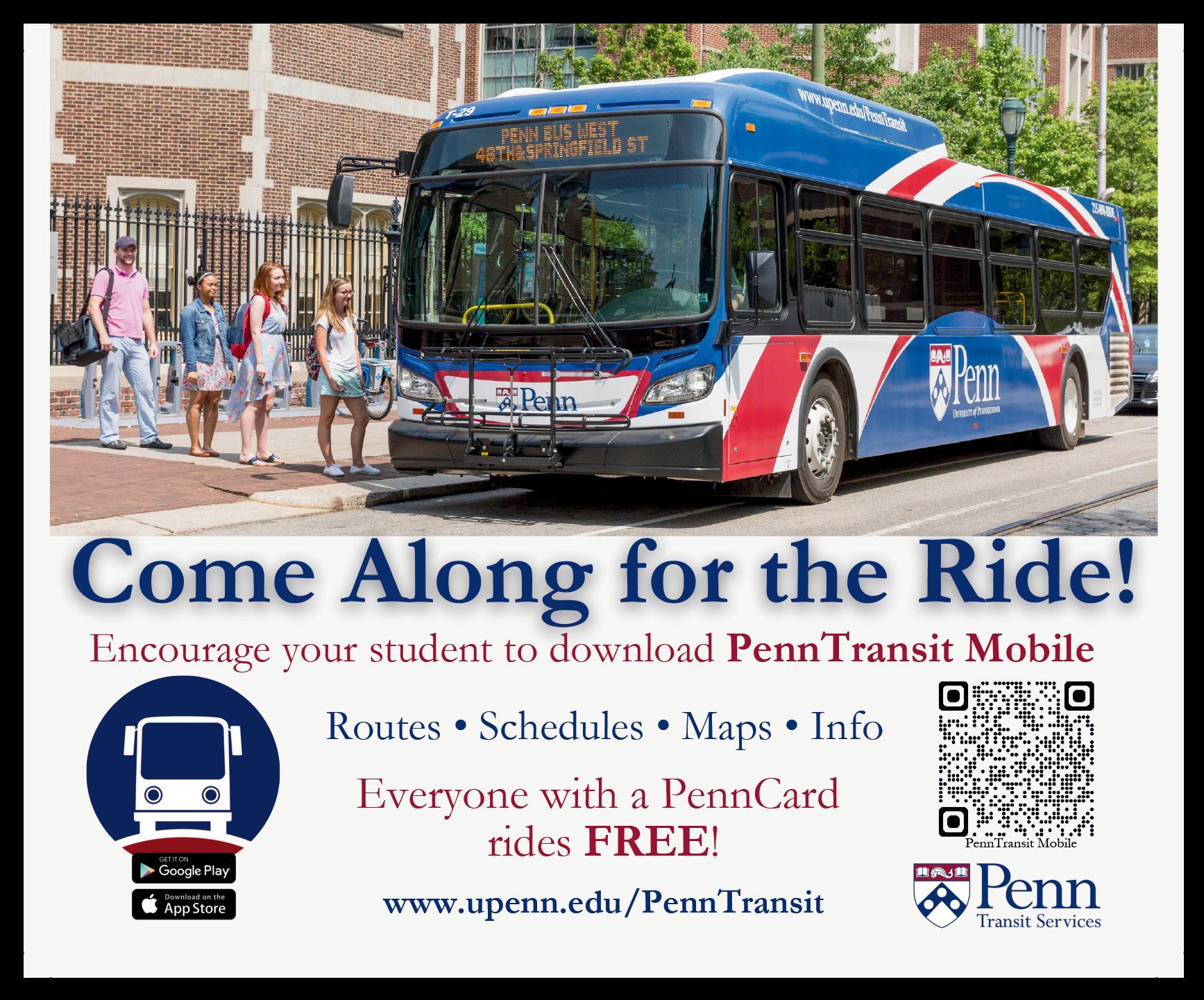
Evening Safety Shuttles augment Penn Transit’s fixed-bus routes and can be requested via the PennTransit Mobile app from 7:30 p.m.–3 a.m. daily, except for holidays observed by the University.
With the PennTransit Mobile app— downloadable via Apple or Google Play— riders can use their mobile devices to track Penn Bus routes and request an Evening Safety Shuttle.
Students can also utilize Walking Escort, a free program from Penn’s Division of Public Safety providing specially trained uniformed security officers who facilitate travel on and around campus.
PAT provides transportation within service boundaries for persons with disabilities. To inquire about these services, contact the Office of Student Disabilities Services at (215) 573-9235 .
The Indego Bike Share program is an integrated system featuring more than 700 self-service bicycles and 250+ bike-share stations throughout Philadelphia, including 6 stations on Penn’s campus. Participants can purchase a daily or monthly pass. With Indego, there is no need to bring a bike to campus!
Penn Transit Office
ͤ #520 Pennovation Works 3401 Grays Ferry Avenue Philadelphia, PA 19046
�� (215) 898-7433 Fax: (215) 573-4033
Ȱ transit@upenn.edu
�� upenn.edu/transportation
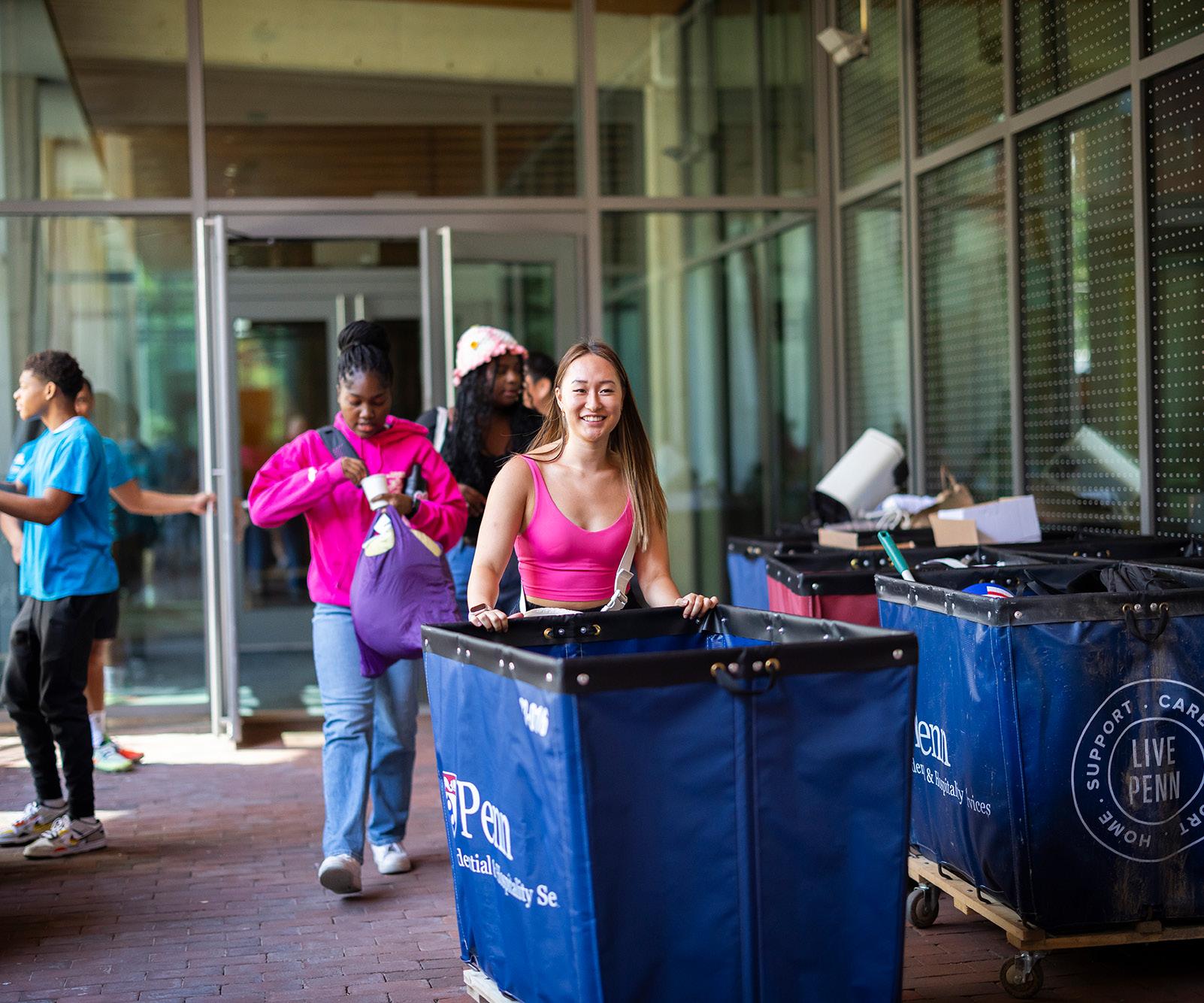
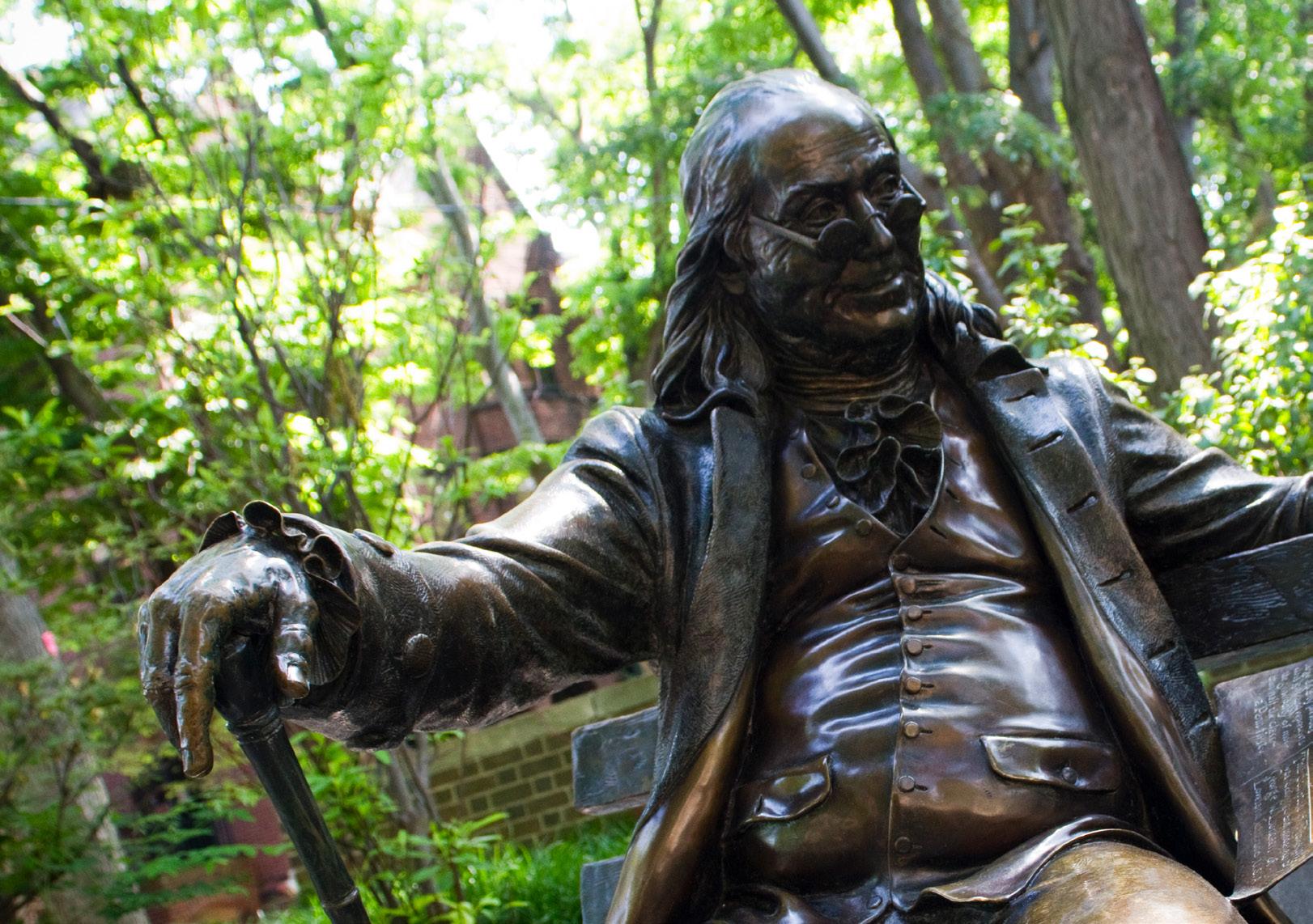
Through playful curiosity and exploration, University life fosters engagement and leadership opportunities to promote personal growth and self-discovery for all students. Whether it’s Platt Performing Arts Center, Greek Life, Naval ROTC, student government, or one of the 800+ student clubs and organizations, students are equipped with the tools to make meaningful contributions to their communities, striving towards a life of purpose and fulfillment.
�� universitylife.upenn.edu/engagementleadership
University Life is home to six Cultural Resource Centers (CRCs) that enrich the campus environment through academic engagement, cultural celebration, and community building. These community hubs promote intercultural understanding and belonging. The centers work collaboratively to create welcoming and affirming spaces for all students to learn about themselves and their different communities on campus.
�� universitylife.upenn.edu/crc
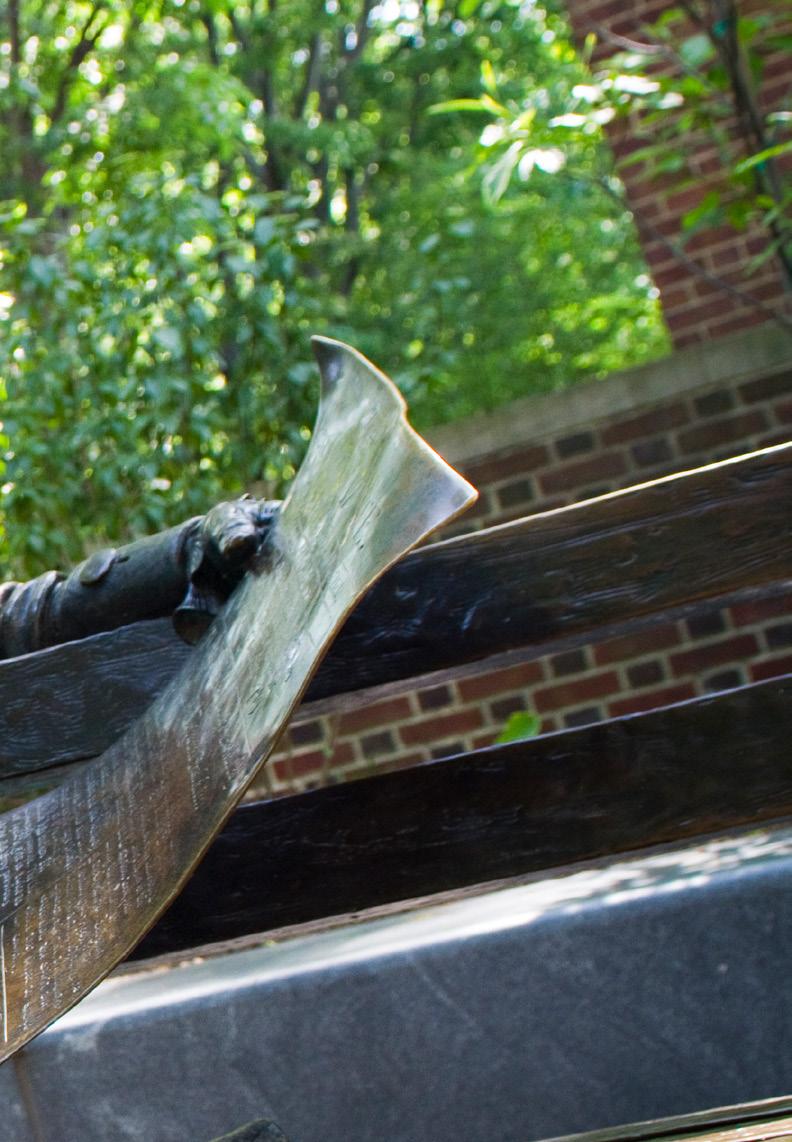
University Life creates and sustains a culture of care and support for undergraduates, graduates, and professional students. From comprehensive mental health resource support and disability services to peer-led educational programs, students have access to multiple avenues for seeking assistance or guidance. It provides critical resources through a unique model of community care, case management, and education in collaboration with campus partners. �� universitylife.upenn.edu/care-support
Each year, Penn holds Family Weekend, a time for you and your Penn student to enjoy events and activities on-campus. Family Weekend events traditionally include faculty presentations, campus tours, the chance to attend class with your student, and a wide variety of entertainment options. Family Weekend 2025 will take place October 24–26. Registration will open in the summer. Please visit osa.universitylife.upenn.edu/fw to check the status of any planned events, as well as register for the weekend.

Residential Services manages housing services in support of on-campus residents in the College Houses, as well as faculty, staff, and guests of the University. The department also manages the Office of Off-Campus Services, which provides educational and advisory services to those seeking housing in Penn’s off-campus neighborhoods.
Some operations overseen by Residential Services include:
z Management of room assignment and billing processes
z Facilitation of move-in and move-out
z Provision of 24/7 services through residential Information Centers providing guest and visitor access, liaising with Facilities Services for resident maintenance and repair issues, building-wide communications about services, resources, and processes
z Liaison with the Division of Public Safety for ensuring residential safety and security
z Mail and laundry services
As part of the Second-Year Experience (SYE), students will live in a College House for their first four semesters, allowing them to fully integrate into the Penn community. Course units (CUs) or class standing will have no bearing on the requirement.
The Residential Services webpage, upenn.edu/housing , is updated through the year with contact information, helpful links, and dates for important on-campus processes such as Move-In, Room Selection, Move-Out, and University closings. Off-campus links, information, and resources can also be reached through the Residential Services webpage.
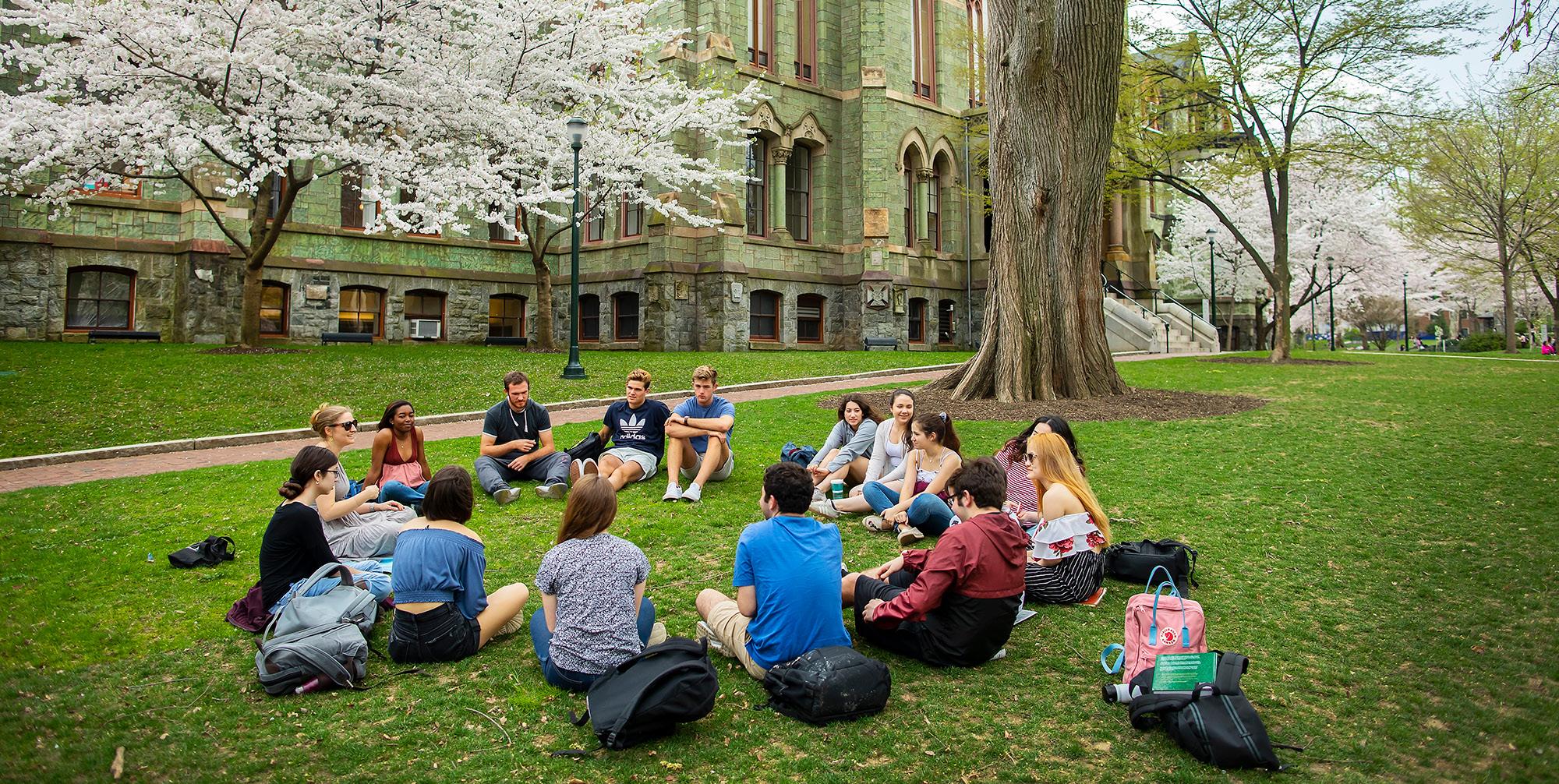
A student’s home is the cornerstone of college life, and at Penn there’s certainly a range of community options.
There are 13 College Houses, representing more than a century of architectural styles and offering a wide variety of accommodations, which serve as home to approximately 6,000 undergraduates.
College House life encompasses strong communities, close connections with live-in Penn faculty, fun and informative events, and leadership opportunities. The Houses also serve as contact points for student academic success and personal support via a 24-hour on-call system. CHAS works to provide an environment of belonging, conducive to academic success and enrichment for on-campus residents.
Collectively, the Houses also offer over 25 smaller, tight-knit communities called Program Communities (PCs) that unite people who share a particular passion or area of interest outside the classroom. From Women in Leadership to Healthcare Innovation, residents can gain enormous personal and pre-professional experience from membership in these communities. The Film Culture and Language & Culture Programs in Gregory, along with W.E.B. Du Bois' Zulu in Residence program, even offer academic credit for in-House participation. A complete list of communities is available online: collegehouses.upenn .edu/life.
Fisher Hassenfeld College House
Closed for Renovations
Hill College House
ͤ 3333 Walnut St Philadelphia, PA 19104
�� (215) 898-5237
Ȱ hill@collegehouses.upenn.edu
�� hill.house.upenn.edu
Kings Court English College House
ͤ 3565 Sansom St Philadelphia, PA 19104
�� (215) 898-2530
Ȱ kce@collegehouses.upenn.edu
�� kcech.house.upenn.edu
Lauder College House
ͤ 3335 Woodland Walk Philadelphia, PA 19104
�� (215) 898-3350
Ȱ lauder@collegehouses.upenn.edu
�� lauder.house.upenn.edu
Riepe College House
ͤ 310 S. 36th St Philadelphia, PA 19104
�� (215) 898-2855
Ȱ riepe@collegehouses.upenn.edu
�� riepe.house.upenn.edu
Ware College House
ͤ 3650 Spruce St Philadelphia, PA 19104
�� (215) 898-9531
Ȱ ware@collegehouses.upenn.edu
�� ware.house.upenn.edu
Four-Year Houses
Gregory College House
Class of 1925:
ͤ 3941 Irving St Philadelphia, PA 19104
Van Pelt Manor:
ͤ 3909 Spruce St Philadelphia, PA 19104
�� (215) 573-5171
Ȱ gregory@collegehouses.upenn.edu
�� gregory.house.upenn.edu
Stouffer College House
Mayer Hall
ͤ 3817 Spruce St Philadelphia, PA 19104
Stouffer Hall
ͤ 3702 Spruce St Philadelphia, PA 19104
�� (215) 573-8473
Ȱ stouffer@collegehouses.upenn.edu
�� stouffer.house.upenn.edu
W.E.B. Du Bois College House
ͤ 3900 Walnut St Philadelphia, PA 19104
�� (215) 898-3677
Ȱ dubois@collegehouses.upenn.edu
�� dubois.house.upenn.edu
College House at the Radian
ͤ 3925 Walnut St Philadelphia, PA 19104
�� (215) 573-8874
Ȱ theradian@collegehouses.upenn.edu
�� radian.house.upenn.edu
Gutmann College House
ͤ 211 S. 40th St Philadelphia, PA 19104
�� (215) 573-8101
Ȱ GutmannCollegeHouse@collegehouses. upenn.edu
�� gutmann.house.upenn.edu
Harnwell College House
ͤ 3820 Locust Walk Philadelphia, PA 19104
�� (215) 573-3497
Ȱ harnwell@collegehouses.upenn.edu
�� harnwell.house.upenn.edu
Harrison College House
ͤ 3910 Irving St Philadelphia, PA 19104
�� (215) 573-3539
Ȱ harrison@collegehouses.upenn.edu
�� harrison.house.upenn.edu
Rodin College House
ͤ 3901 Locust Walk Philadelphia, PA 19104
�� (215) 573-3576
Ȱ rodincollegehouse@collegehouses. penn.edu
�� rodin.house.upenn.edu
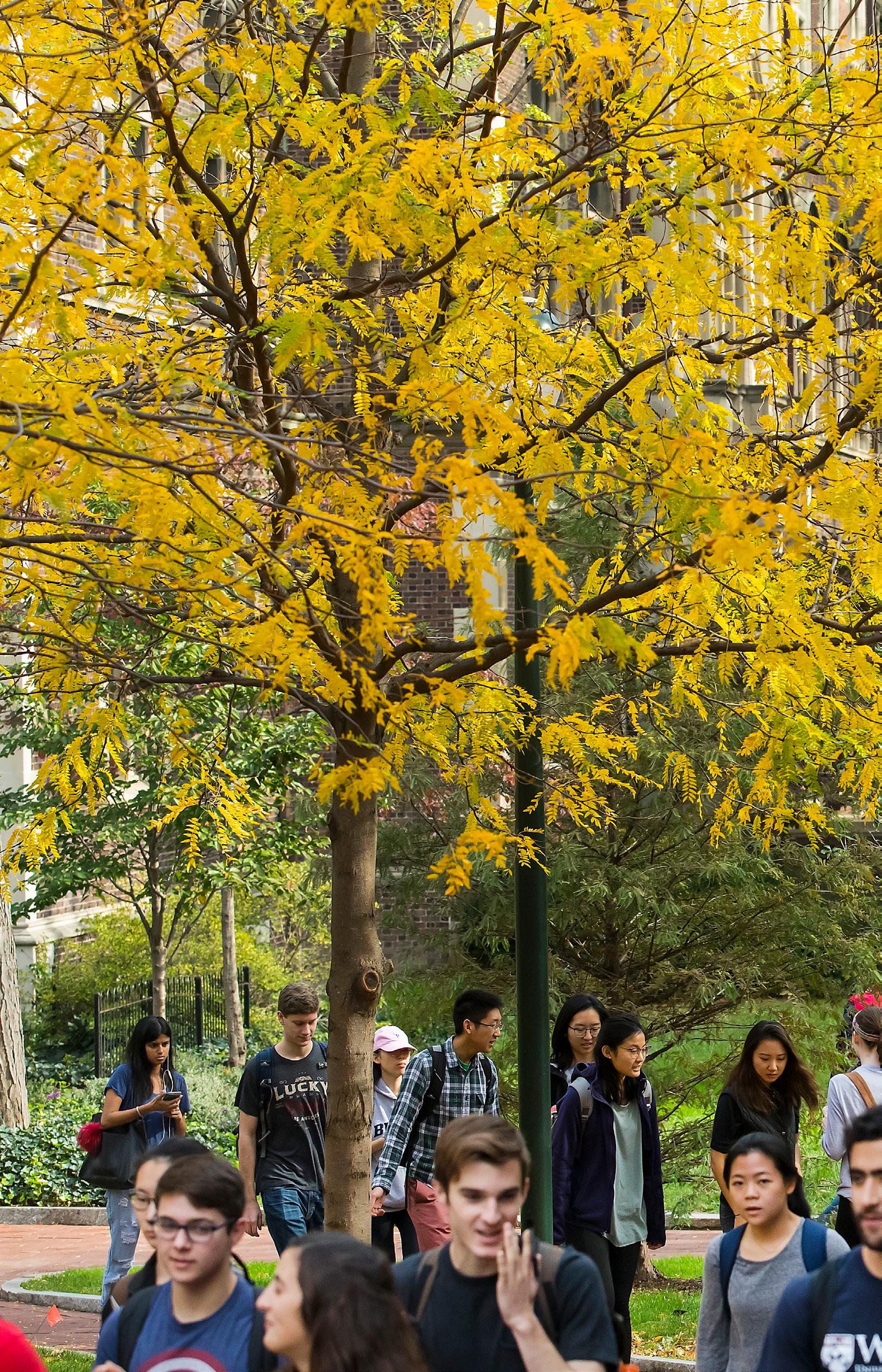
As the University’s foodservice professionals, we oversee food operations and dining services and consult on all food-related planning issues. Our mission is to ensure the delivery of consistent, high-quality food to a diverse on-campus clientele. Penn Dining brings flavorful, nutritious food and helps create community across campus by providing easy access to conveniently located, great-tasting meal options right on campus.
Recognizing the dining experience will be part of your student’s daily life, Penn Dining – together with our food service provider, Bon Appétit, is committed to your student’s well-being.
From the east side of campus to the west side, we have a dining café located within 600 steps from where you live, work, or study. Meals center on abundant fresh produce, whole grains, and lean and/or plant-based proteins, prepared with minimal amounts of healthy, plant-derived fats.
Vegan and vegetarian options are available throughout our cafés. Flavors are developed through skilled, healthy cookingtechniques, with the use of fresh herbs and authentic spices, not through unhealthy shortcuts of using fat, sugar, and salt.
We believe good health is about the choices you make every day at every meal. Through creating conscious, healthy eating patterns, engaging with our community, and addressing the environmental issues surrounding food sourcing and food waste, we make sure to look at dining holistically. We focus on special dietary and nutritional needs through our on-campus Registered Dietitian Nutritionist.
In addition to meal swipes and Dining Dollars, we accept cash, credit, SFS Credit, and PennCash in all of our residential and retail locations.
With 14 locations on campus, students have the opportunity to explore a variety of dining options. Each café has a unique feel and cuisine. Lauder College House offers a nightly featured entrée, a chefcurated special featuring dishes such as lobster mac and cheese. Quaker Kitchen (Gutmann College House) features a weekly rotating menu and provides students the opportunity to have a restaurant-like experience (reservations required). Hill Café is known for its weekend brunch, and breakfast all day. Parents and guests are always welcome to dine in any of our cafes. We take our role in the community seriously by making socially responsible purchasing decisions in regard to produce, meat, seafood, eggs, and coffee. We also compost kitchen waste, use recycled materials in all our cafés, and donate leftover prepared food to organizations addressing food insecurity in our community.
First and second-year undergraduate students are required by the University to purchase a dining plan. First-year students can choose one of two plans. Second- year students can choose a first-year plan or a specific second-year plan. All plans are comprised of visits and Dining Dollars. Third and fourth-year undergraduate students have the option to enroll in a dining plan and can choose between all available plans to find the best fit for their lifestyles.
Students can use their meal swipes (visits) in any of our six residential cafés including 1920 Commons, English College House, Hill House, Lauder College House, Quaker Kitchen (Gutmann College House), and Falk Kosher Dining . Each time your student eats in a residential café, one visit is subtracted from the semester allowance. Additional visits can be purchased if your student runs out. Guest visits are included as part of the semester allocation of meal swipes.

Your student has two convenient options to ship items to (and from) campus.
Mail and parcel delivery to the College Houses is managed by Residential Services. All other campus mail is managed by Penn Mail Services.
Amazon@Penn, located on campus within 1920 Commons, offers a secure and convenient place for students to pick up Amazon orders. Amazon Student and Prime members also get Free Same-Day or OneDay Pickup on a wide selection of items.
All Penn students are eligible to participate. Students shop for items they wish to purchase and, if they have a Free SameDay or Free One-Day account, choose Amazon@Penn as their shipping address during checkout. They will then receive an email or text message when their package is ready for pickup.
In order to ensure timely delivery, all parcels and mail sent to campus must use the official U.S. Postal Service address format. Specific information can be found at the Residential Services website upenn.edu/housing on the “Resources” page. Students should note that their mailing address is different than their campus residential address. Residents can contact housingmail@lists.upenn.edu for any questions about their mail service.
Residents can begin shipping their nonessential items to campus two weeks ahead of their move-in date.
Note: USPS “delivery confirmation” mail sent to campus is confirmed upon arrival at the Philadelphia Post Office before delivery to the Penn campus. In other words, a USPS confirmation of arrival does not confirm delivery to the student.






The University is strongly committed to providing exceptional health and wellness services to your student throughout their time at Penn. Wellness at Penn's mission is to infuse wellness across its eight domains throughout the Penn experience through inclusive, innovative, and impactful initiatives, with a vision of a campus that integrates the science, theory, and practice of wellness. Wellness at Penn is comprised of two pillars: Student Health and Counseling and Public Health and Wellbeing. We invite you to follow us on Instagram @wellnessatpenn to learn more.
Student Health and Counseling provides support and care for Penn students on their academic journey. Whether through physical, emotional, or social concerns, students may need support to face these challenges. Recognizing the need for help is a sign of strength and is often the first step in effectively managing difficulties.
Medical care is provided in our stateof-the-art primary care center (located at 3535 Market Street, Suite 100) by our team of dedicated clinicians who are
committed to the health and wellbeing of Penn students. Our team provides compassionate, accessible, cost-effective, culturally sensitive, and student-focused treatment, including care for sick visits, injuries, chronic medical conditions, preventive health services, health and wellness education, stress management, and immunizations. We offer convenient telehealth and virtual visits to better align with student choices and preferences. Our center is a gender-affirming and transinclusive office with providers experienced in caring for transgender clients. Privacy and confidentiality are of utmost concern.

The dedicated members of the Division of Public Safety (DPS) are responsible for enhancing the quality of life, safety, and security of our community.
The Division of Public Safety delivers a comprehensive and integrated safety and security program in partnership with the community that we serve. Public Safety provides numerous resources to ensure your student’s experience at Penn is safe and secure.
Emergencies: (215) 573-3333 or 511 from any campus phone; 911 for Philadelphia police and fire departments.
General Information: (215 ) 898-7297
�� publicsafety.upenn.edu
24/7 Walking Escort Services
Call (215) 898-WALK (9255)
Public Safety Security Officers will walk with your student anywhere in the Penn Patrol Zone. The FREE Walking Escort service extends between 30th and 43rd Streets and Market Street to Baltimore Avenue, 24 hours a day, 365 days a year. It also extends west to 50th Street and north/south from Spring Garden Street to Woodland Avenue, between 10 p.m. and 3 a.m. via the University’s partnership with the University City District Ambassador Program.
How to Request a Walking Escort:
z Ask any Public Safety Officer on patrol or inside a building
z Call (215) 898-WALK (9255) or 511 (from campus phone)
z Use one of the many building and blue-light phones located on and off Penn’s Campus
�� publicsafety.upenn.edu/about/securityservices/#services
Penn Buses and Shuttles operate yearround except for holidays observed by the University, free of charge to all Penn community members holding a valid PennCard. Fixed route buses operate from 4 p.m. to midnight weekdays (Monday through Friday). Evening shuttles operate from 7:30 p.m.–3 a.m. seven days a week and offer door-to-door service via mobile app, PennTransit Mobile, which sends realtime vehicle location information directly to mobile devices.
Visit upenn.edu/transportation for more information.
The HELP Line is a 24-hour-a-day phone number for members of the Penn community who seek time-sensitive help navigating Penn’s resources for health and wellness.
Any member of the Penn community can utilize this service by calling (215) 898-HELP (4357). Calls are answered 24 hours a day, 7 days a week by Division of Public Safety professionals trained in mental health referrals by staff from Student Counseling.
Students dealing with the complex emotional challenges of university life can use the HELP Line to receive information and referrals to the many health and wellness resources at Penn, including Student Health and Counseling, Student Intervention Services, Public Safety, and others. They may also call on behalf of a friend or acquaintance. Parents concerned about their student may also call the HELP Line for assistance.
The UPennAlert Emergency Notification System enables the University to quickly notify the Penn and surrounding Philadelphia community of critical information during significant emergencies. This is accomplished through three key methods: Personal Messaging; Siren and Public Address Systems; and the DPS Website.
Currently, the University can notify all Penn faculty, staff, and students through text messaging and email. The University also has siren and public address systems in place to send a UPennAlert. When a UPennAlert is sent, the Division of Public Safety uses their website to provide current and continuous updates, acting as a central reference point for accurate information. Angle-right




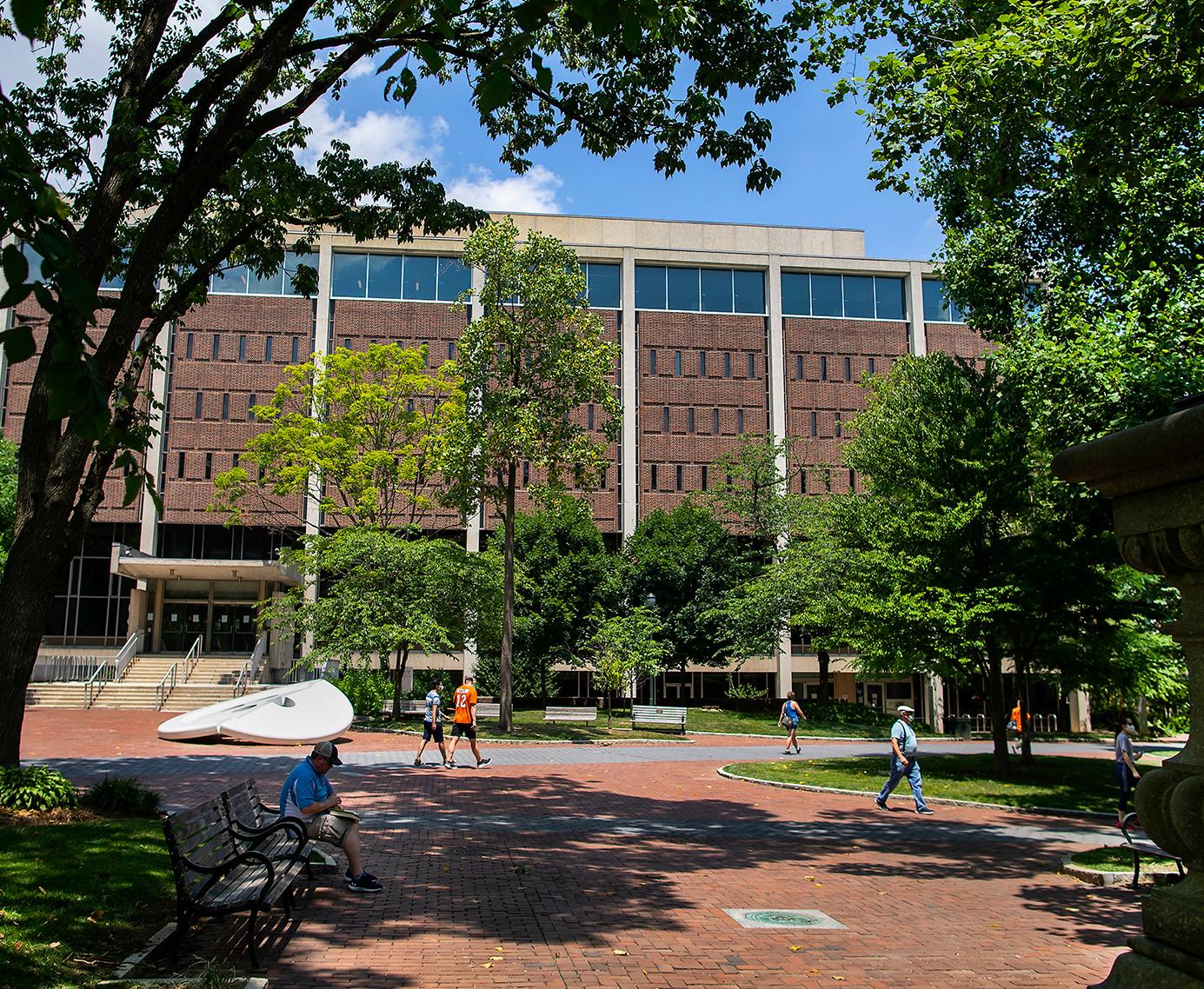
The effectiveness of the UPennAlert via personal electronic devices depends upon faculty, staff and student providing accurate and up-to-date personal contact information. Encourage your student to partner with the University in registering a cell phone number, as well as other emergency contact information, so that University officials can communicate in an emergency.
�� publicsafety.upenn.edu/pennready/ upennalert
Penn Guardian is a free app that is available to all Penn community members. It was developed by the University’s safety partner Rave Guardian, a service utilized on college campuses across the country.
Registering is easy — search “Rave Guardian” in the App Store for iOS devices or Google Play for Android devices. You will be prompted to enter your name, phone number, and Penn email address, which provides access to the University’s
customized interface. Calls from a registered phone will allow Penn Police to determine your cell phone’s GPS location, which can decrease response time. This information will only be available to Penn Police if you call the PennComm Communications Center (PennComm) directly, either through the app or at (215) 573-3333
If a call is made to PennComm, and you are unable to speak — perhaps because of an allergic reaction — a call taker will send a text message to your phone. You can then communicate directly via text. The app also provides a confidential way to submit a tip to Penn Police — with a photo, if necessary — through a text message.
For more information, please visit the Penn Guardian website at publicsafety.upenn.edu / safety-initiatives/pennguardian

Founded in 1963, ICA at Penn is committed to living artists and the cutting-edge art of our time. The museum presented Andy Warhol’s first solo exhibition in 1965 as well as significant shows of Agnes Martin, Robert Mapplethorpe, Glenn Ligon, Richard Artschwager, Karen Kilimnik, Lisa Yuskavage, and many others.
In The New York Times, critic Roberta Smith observed, “On a surprisingly regular basis, the tiny Institute of Contemporary Art ... mounts exhibitions that make the contemporary art adventures of many larger museums look blinkered, timid, and hidebound.”
ICA admission is always free.
ͤ 118 South 36th St Philadelphia, PA 19104
�� icaphila.org
Our local arboretum is an ever-changing 92-acre landscape of colorful gardens, winding paths, bubbling fountains, and majestic trees. It includes the nationally award-winning Out on a Limb exhibit that puts you 50 feet up in the treetops (without having to climb!) The Morris Arboretum is a perfect escape in any season with special events all year long. Just 13 miles from Penn’s campus, it is accessible by car, bike, and public transportation. Admission is free with PennCard.
ͤ 100 East Northwestern Ave Philadelphia, PA 19118
�� (215) 247-5777
�� morrisarboretum.org
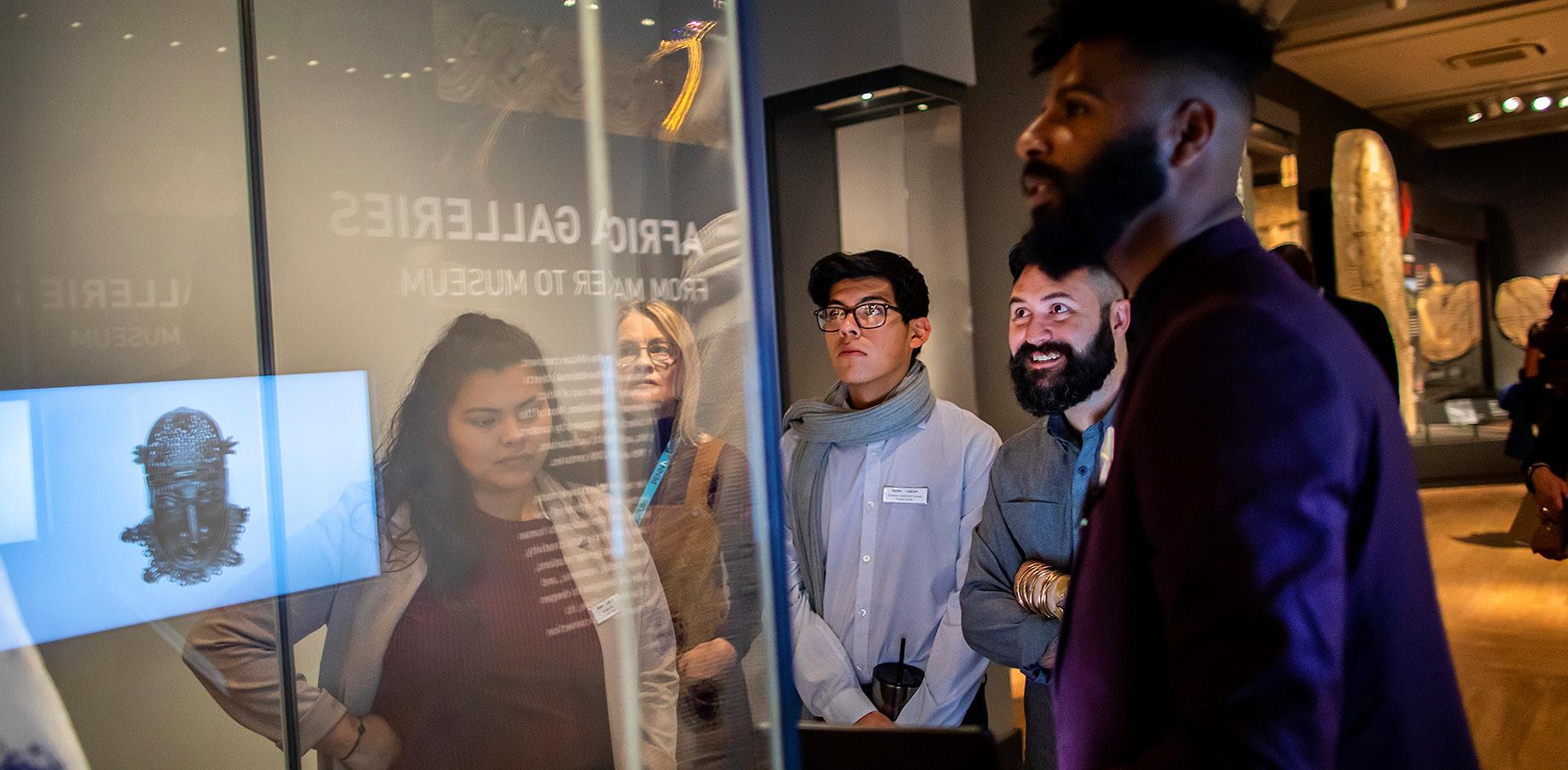
Founded in 1971, Penn Live Arts at the University of Pennsylvania is a major cultural destination and crossroads in the performing arts, connecting Philadelphia regional audiences and the University of Pennsylvania through exposure to innovative human expression in theatre, music, and dance.
ͤ 3680 Walnut St Philadelphia, PA 19104 �� pennlivearts.org
Penn Museum
(University of Pennsylvania Museum of Archaeology and Anthropology)
Home to over a million extraordinary objects, the Penn Museum has been highlighting our shared humanity across continents and millennia since 1887. Highlights include the 25,000-pound red granite Sphinx of the Pharaoh Ramses II,
a newly unveiled Eastern Mediterranean Gallery: Crossroads of Cultures, and galleries that showcase life in Mexico and Central America, Africa, the Middle East, Asia, and more.
Activities of interest for students include “Making Workshops,” research opportunities, the Great Lecture Series, internships, and fellowships, cultural film screenings, as well as the Clio Society. Named after the Greek Muse of history, the Clio society gives students a platform to enhance and strengthen their undergraduate experience through the Museum’s many resources. Clio brings together students who share a common interest in and appreciation for museums, culture, and art. The Penn Museum is free for anyone with a PennCard. Follow us @pennmuseum.
ͤ 3260 South St








Penn Athletics
�� (215) 898-6151
�� pennathletics.com
Penn Hillel
�� (215) 898-7391
�� pennhillel.org
Penn Student Agencies
�� (215) 898-6815
�� psa.vpul.upenn.edu
Penn University Life
�� (215) 898-6081
�� universitylife.upenn.edu
Weingarten Center
�� (215) 573-9235
�� wlrc.vpul.upenn.edu
Offices and Services
Wellness at Penn
�� (215) 898-7021
�� wellness.upenn.edu
Division of Public Safety/University of Pennsylvania Police Department Campus
Emergency Number:
511 from any campus phone or
�� (215) 573-3333
Available 24 hours a day/365 days a year
�� publicsafety.upenn.edu
Office of the Registrar
�� (215) 898-6636
�� srfs.upenn.edu/registrar
Office of Undergraduate Admissions
�� (215) 898-7507
�� admissions.upenn.edu
Penn Dining
�� (215) 898-3547
�� upenn.edu/dining
Penn Parents Outreach and Development
�� (215) 746-4646
Ȱ ppparent@dev.upenn.edu
�� pennparents.upenn.edu
Residential Services
�� (215) 898-3547
�� upenn.edu/housing
Student Financial Services
�� (215) 898-1988
�� srfs.upenn.edu
Wellness at Penn: Student Health and Counseling Counseling:
�� (215) 898-7021 (24/7)
Medical care:
�� (215) 746-3535 (24/7)
�� wellness.upenn.edu/student-health-andcounseling
Wellness at Penn: Public Health and Wellbeing
�� (215) 898-0300
�� wellness.upenn.edu/public-health-andwellbeing Please






• $0 monthly service charge for up to 6 years1
• 60,000 fee-free PNC and Partner ATMs nationwide2
• $0 minimum monthly balance
Apply today.
• See us when we’re on campus at the University of Pennsylvania
• Visit pnc.com/penn
• Find your nearest PNC branch at 3535 Market Street or 200 S. 40th Street
• Free financial education
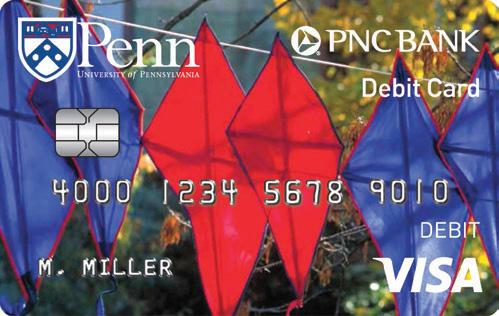
1 Virtual Wallet Student has no minimum balance requirement or monthly service charge for active students for six years from the date of account opening. You may be asked to provide proof of active enrollment in a qualifying educational institution. At the end of the six years, your account will be converted to Virtual Wallet and subject to the Virtual Wallet features and fees in effect at that time. If you transfer this account to a different product or account type during the first six years, you will forfeit the benefits of the Virtual Wallet Student account and will not be able to transfer back to the Virtual Wallet Student account.
2 Partner ATMs are not owned by PNC and may be limited to cash withdrawal functionality. In exchange for the opportunity to promote its programs to the Penn Community, PNC provides Penn with financial contributions that Penn uses to sustain important student programs and other University initiatives.